#and how they made the lines and acting choices just subtle/ambiguous enough to work for both
Explore tagged Tumblr posts
Note
I really share a lot of your sentiments, the frustrations and especially the grief regarding enstars— I'm a relatively new enstars fan, well if 2022 is still "new" and for so long I avoided the game because it seemed so massive, the kind that seemed almost too big to fail and would lsst years down the line. I was kind of the type that found old franchises years after their original creators had moved on or abandoned those projects.
This to say, I usually can't imagine how heartbreaking it is to have been a long-time fan of a franchise... but actually you've helped me understand it since I actually learnt a lot about Switch and the Eccentrics through your posts, and it probably started from the post you had about recommending some stories to an anon that helped me appreciate the unit in general. ( Seeing your comments after events was also a blast, I think you were one of the people I followed for a long time ? I've changed accounts and all often but I kept coming back for the art too <3 )
So I can't believe people would say that "we're just hating for the sake of hating" because it's very clear how much you love and appreciate enstars, and I think people forget that you can't feel betrayal for something you always hated, there had to have been love and trust— trust that was squashed away in that act.
It's really devastating to see that the Enstars that first drew me in is slowly changing into a whole different thing altogether, that the devs have decided that they don't value their most loyal and dedicated fans since they keep carelessly handling the idols we've grown attached to. When they keep reusing old schticks and tropes in one moment to appeal to older fans only to make some needless change to try and garner a newer audience. And it always seems like they keep gambling away any sort of coherency just to try and be hip with the younger generations even if most of their income is from young adults.
It's really just so jarring, and I get others trying to tnink positively or make light of the new situation but happy ele isn't even being subtle about it at all.
Sorry for the long ass ask, I hope you've been doing alright though nat-san 💖
WAAAA it makes me so happy to hear i managed to have a positive impact on ur fandom experience!! q__q and im actually a somewhat "new" fan myself funnily enough! though maybe 2021 isnt new anymore... but the sole reason i even created this account is because at the time there was a huge lack of switch content, esp in the eng speaking fandom, and i really wanted people to love this unit as much as i did!!! i hadnt been consistently drawing for quite a while, but this drive got me out of that slump and made me try learning rendering (as id usually just do sketches)
i also just love gushing about little knickknacks i notice here and there, and it has genuinely been such a delight getting to share my thoughts with the fandom, even if i sometimes am most certainly reaching AJKSHDF BUT THAT WAS KINDA WHAT MADE IT SO FUN??? what i adored was how things would be implied but never outright said. how even things like the designs carry so much meaning. The symbolism of it all. but i just dont see any of this featured in the new stories.... at least for switch. And that really upsets me because everything about them had always genuinely felt so "magical." and a rule of magic is to not explain it or it ruins the mystic. If your text focuses too much on explaining why things are the way they are, it becomes purely informational and by proxy loses any and all magic and splendor.
"it works instead of plays" to quote byung-chul han. This is what the recent writing choices have felt like. And thats bad story telling imo!!!! i love when things are left ambiguous!!!!! you do not need to explain every little detail!!!!!!!!! some things are not MEANT to have concrete answers!!!!!!!!!!!!!!!! but happyele insists on explaining shit anyway!!!!!!!!!!!!!!!!!!! literally what was the fucking point of telling us that natsumes weird fucking hairstyle means literally nothing and is just a fun hairstyle when its SO BLATANTLY a reference to the red string of fate if not so they can go ahead and chop tsumugis hair off, to name one example?????? or tsumugi mansplaining the meaning behind the unit name "switch" in tri-lights, having the dumbest nonsensical explanation known to man because how the FUCK do you come up with the S in switch standing for sports before even realizing it has WITCH IN THE NAME???? you DO NOT NEED TO EXPLAIN THESE THINGS. YOU ARE ERADICATING THE WHIMSICALITY OF THE UNKNOWN. IF THINGS ARE LEFT UNKNOWN THAT MEANS THERES ENDLESS POSSIBILITIES AND ITS FUN TO SPECULATE. ITS FUN TO NOTICE THINGS. THESE ARE DESIGN CHOICES, YOU DO NOT NEED TO RECOGNIZE THEM IN THE DAMN STORIES!!!!!!!! but the writers CANNOT come up with ANY real substance anymore so THIS IS WHAT THEY RESORT TO.
you can have intent and NOT NEED TO MENTION SAID INTENT EXPLICITLY. AND ITS EVEN WORSE WHEN WE KNOW THE INTENT AND THEN THEY GO COMPLETELY AGAINST IT, LIKE TSUMUGIS HAIR LENGTH BEING MEANT TO REPRESENT HOW LONG HES LIVED!!!!!!! ONLY FOR THEM TO CUT THAT LIFE RIGHT OFF!!!!!!!!!!!! they keep explaining things which not only makes them lose their magic by proxy, but also EXPLICITLY GOING AGAINST WHAT MADE THEM MAGICAL TO BEGIN WITH. TSUMUGIS HAIR THING IS WRITTEN IN THE FIRST EVER ARTBOOK. HE WAS MEANT TO GROW HIS HAIR OUT AND HIS HAIR WAS MEANT TO GROW EVEN LONGER TO REPRESENT HIM FINALLY LIVING. BUT BECAUSE PEOPLE THOUGHT IT WAS UGLY THEY NOW DECIDED TO KILL IT TO TRY AND DRAW IN A NEW AUDIENCE. IM BAFFLED. AND IN WONDER GAME HE EVEN SAID "THANKS TO THIS NEST [HAIR] THIS BLUE BIRD CAN KEEP LIVING" OR WHATEVER. HIS HAIR IS DIRECTLY TIED TO HIS LIFE. PEOPLE ONLY EVER TALK ABOUT THE NTMG ASPECT BUT IT GOES SO MUCH DEEPER THAN THAT. YOU CANNOT CLAIM TO LIKE TSUMUGI AND CARE ABOUT HIS CHARACTER IF YOU LIKE HIS HAIR CHANGE. NATSUMES NOT THE ONLY REASON BEHIND IT.
anyway. ahem. ill leave my rant regarding the current writing state of enstars (aka specifically wish) for another day because theres genuinely so many contradictions in that story, even having dialogue WITHIN the story contradict ANOTHER dialogue within the story. Like you can tell that shit literally wasnt even proofread. but im saving my more elaborate thoughts on this story for when i read a full proper TL to ensure MTLs arent lying to me
but yea. another thing is how its so clear the reason theyre taking this sudden approach is to try and compete with project sekai/draw in that audience. a blatant example being esupuris very existence. But now you can also see it in the UI change, outfit customization looking the exact same as prsks, the airship park thing also looking like something ud find in prsk, etc etc. There has also been a sudden lack of care for established units, with them mixing and mashing so many charas together to release new songs that often have no grounds in canon. Just doing it for the sake of generating the hype shuffle units gave, not realizing part of what made shuffles so fun was seeing the characters interact with new people. and, since it was somewhat rare, it felt exciting every time it happened!! but i wish we got more unit content..... only getting one event per year is gonna stagnate so much growth......
i rambled on alot ok ill wrap it up now BUT!!!! i do wanna mention that i do still have SOOO many thoughts about so many things, and i notice new things every time i reread the older stories, and it fills me with as much joy as the first time i read them!! so if i can find a way to articulate myself id love to share my little findings with u all!! and, ofc, im still gonna draw the characters i love and adore!! despite my ramblings, im actually coping rather well with how enstars is. im surrounded by so many lovely people (including u guys here on tumblr!!) who make me feel less alone in my grievances, and that really helps me keep my head up high! plus, i have my friends who continue to discuss the things we adore about these guys together! the only downside is seeing others celebrate the current state of the game/defend it. its hard to believe they care alot about the game with how they talk. and artists are gonna continue to draw the new looks and such.... so i cant engage with the fandom like i used to. but thats ok i think.... ive bought fan comics to help cope with a lack of food!! would much rather support fellow artists than this company anyway!!!!
#ask#sorry i have so much to say always constantly#theres more i could say in fact. But this is quite literally just me saying the first thing that comes to mind so
9 notes
·
View notes
Text

A LITTLE FEAR — Pt. 1 The First Hello
↪Jean Kirstein mini-series
↪content; canon universe, description of violence, season 4 spoiler, forbidden love, marleyan!reader, scouts!jean

"I would love to know a world without fear."
The night was quiet as the moonlight became the only thing that lit up the space you were in. No sound could be heard, save for the subtle heartbeat that penetrated your hearing.
It was so chilly today, notifying you that it was almost time for winter. You never really loved the weather to say the least, because most of the time the room temperature could drop so much even when you had a heater turned on in every crook of your house.
You hated how your fingertips could feel so numb that you wondered if they were still there. You hated how you needed to cover your body, layer after layer just to keep you warm. You hated how you had to drink the hot chocolate that you made within two minutes or else it would go cold already.
But maybe this year, you had something that you loved from it.
A small hum coming from his lips, with how your head was laying on his chest, you could feel how the sound reverberated through it. His arms draped loosely around your body, securing you there in his embrace as his finger caressed your skin.
This was the warmth that you had longed for, a physical contact which you always seek. The one that could make you feel like everything would be alright, one that made you feel — safe.
"What do you mean by that, hm?" He asked nonchalantly, but you knew him enough to hear the serious tone from his composed gruff. His usually smooth and silvery voice now sounded a lot breathy, perhaps caused by how the clock was ticking right at one am.
You didn't look up at him as your eyes fixated on the moon outside the window. Though your mind was now wandering around, mulling if you wanted to have a deep talk tonight. Yes, you had talked a lot about humanity with him before, something that always made his orbs shone a little brighter.
But what you were going to talk about tonight was something more than just a dream or how the both of you saw the world you were living in. There was something more that you needed to know from him. Because somehow you had a gut feeling that something big would happen and alter your relationship with him.
Well, would alter whatever bond it was that you shared with this man called Jean Kirstein.
You shrugged softly before wrapping your arms a little tighter around his torso, snuggling your head at the crook of his neck before you speak up.
"You know, a world without war, a world without discrimination, without a judge from the outside," You trailed off, licking your lips as you continued, still not facing the man you spent the last few weeks with. "Without having to lie and hide who you really are."
There, that was the response that answered your curiosity. It was just a millisecond but you could feel how his body jolted a little. There was nothing in between you and him, you could hear his breath hitched, you could feel how the arms around you twitched.
And without him needing to say anything else, you knew it was there.
"How," He gulped down, and once again, you could feel it. It seemed like he was pondering if it was the right thing to ask, if your words were just a random opinion instead of a statement. But he knew you too, and he knew how smart you were. "How long have you known?"
You didn't move away, and perhaps that fact was enough to make him calm down a little. Your head was still positioned on top of his chest as if you hadn't just cornered him with your words.
"The second night." You even said it so easily. He whispered a low what? under his breath, but you could hear it with how you were literally skin to skin with him. "Don't worry, you are smart to cover all your tracks." Your fingertips trailing on his chest, tracing the marks that now looked like a permanent part of him. "But you could never hide this."
He chuckled a little at this, realising the slip in his cover. You didn't know what was on his mind, perhaps he blamed himself for exposing himself to you, or he wished he didn't fall for your charm. Neither way made you feel any better though.
"So my mistake is sleeping with you.” The way he said it was ambiguous. You knew that he just mumbled that to himself, yet you couldn’t understand if it was a question or realisation. And somehow with that choice of words, you could feel a pang in your heart as you were reminded by the truth.
You and him, it was all just a mistake.
A mistake that both parties knew. A mistake that you both understood yet turned a blind eye over it. There was nothing that could justify the rendezvous that you had with him. He was an Eldian, a man that could turn into a monster if given the titan spinal fluid, even worse, a Paradis citizen.
Then there was you, a pure marleyan, one of the people who wanted nothing but extinction to the island of Paradis. But you had another worst side, and that was the fact that you were the youngest commander of the airborne unit, one that belonged to the Marleyan Military air force.
You were someone who had full control over dozens of airships and hundreds of troops. You were someone who sent people to the front line, bringing them to their death for your greedy country to get more and more, always unsatisfied and wanting another land to conquer.
You were even worse than him who just wanted the freedom that your country took away by force.
But you couldn’t help yourself as he slid into the barstool beside you that day. With his gentle smile, trimmed facial hair, and those magnetic brown orbs that glinted brighter under the dimmed light. You remembered how you let out a small gasp by just taking a proper look at him.
Lots of men and women threw themselves at you but never once you batted your eyes on them. But goddamn Jean Kirstein and his alluring complexion, making you stumble over your own words when he asked you a simple question — your name.
It needed you a minute to finally relax under his piercing gaze, and it only needed an hour for you until you let him take you away from the prying eyes of Marley. You gave in into his touch, calloused hands that rivalled yours. His breath reeked of alcohol and yet you let those plump lips steal the air out of your lungs.
You thought it would only happen once in your lifetime. That rendezvous was shared between two drunk human beings who got attracted to each other. Yet the two of you somehow stood in front of the same motel the next day.
And the day after.
And the day after that until you moved it to your apartment.
And for you, what you had with him was anything but a mistake.
You swallowed a huge lump, gaze hardening as you stared into nothing. He hadn’t said a single word ever since then, and you wondered if he was as disconcerted as you inside. But despite the truth that had been spoken, the two of you still huddled under the warmth of your cashmere blanket.
“I didn’t see it as a mistake, Jean.” You finally confessed, and you never been this scared in your life. You had been through a lot, watching Marleyan titans devour the enemy, scattered brains on the battlefield, and yet you were never once afraid you would be like them someday.
But this, this confession, this fucked up truth about your feelings and what he would do to it was a lot more terrifying than dying in war.
“I see.” You still held your breath even though you already got your answer. It was still grey, you didn’t know what he was thinking right now, not yet. “I, too, don’t have any regret over us.” And that, that answer was enough to paint it white.
You subconsciously snuggle closer, tightening your embrace as you didn’t want to let him go. There was a dream, deep inside your heart that someday everything would end with the whole world united to walk forward together. Without the need for destruction, without the need to shed another blood on their lands.
And just once, just when you were with him was the time you could feel that dream. You could succumb yourself into another world when you laid in his arms, thinking that the two of you were just a normal citizen who would do mundane work when the sun was up, and cuddled up together for every night that came.
But you knew, since the time you traced the marks on his skin when you were sober, when you recalled what your warrior friend told you about his time in Paradis and the gear that made him have permanent marks all over his body, you knew that what you had with him was just a small nirvana that your own mind created.
It wouldn’t last, you knew damn well it could never last. And even though he didn’t say anything, as someone who supposed to be the only one who knew about the truth, he decided to keep on going and entangled himself with you.
For weeks, for weeks he had been here in Marley, doing whatever he needed to do behind your back. You both acted as if you did not belong to the different sides at war, talking and enjoying each other's company and sharing a glass of wine before he went back to his place when the sun was still hiding behind the horizon.
“I have a question.” He cleared his throat, deep in thought as his eyebrows scrunched from either confusion or disbelief. “Why did you tell me about Marley’s plan? Why did you share the war plan with me? Me, your enemy.”
You pondered, why indeed? At some nights he would ask you some questions. But there was nothing too explicit on it as you recall. He would just ask you about your day, about how tiresome your work was, or ask about your condition when you looked so stressed some of the days.
It was just a simple question, yet you always answered some of them with a long answer as you slipped in some information about war here and there. You didn’t do it subconsciously, of course, you were always being sus and never shared work-related topics with anyone outside of the military.
“Because I want you to live.” But he was an exception and perhaps he knew that already. “Even if it’s not significant, I want you to have more chances to be alive.”
You cursed the universe for giving you a chance to love like this. To care for a man that could be killed by your country, or even worse, die by your hand. Was there anyone like you too? A Marleyan who fell in love with Eldian, not just Eldian in Marley even, but the devils themselves.
Being a part of the Marleyan Military means that you knew the truth. You knew how many mindless titans that your country sent to Paradis, and the fact that a few years ago the colossal and armoured titan was successful to breach the wall, that would mean a lot of the citizens of the island lost their lives and home.
And you didn’t dare to ask him about how many family and friends that he had lost.
“You do know that you could be executed for sharing a war plan, right?” He asked with worry lingering in his voice, yet he sounded a little exasperated, couldn’t believe that you would jeopardize either your occupation or your life for him. “You are so reckless, I swear to God.” But at the same time, he was thankful too, because it really showed him how much you care.
“Hmhm, I don’t care.” You just shrugged it off, deep in thought as you thought that the execution was worth it. “I should have died in one of the wars that I went to, yet here I am. Embracing the fact that I might be in love with an Eldian devil.”
He squeezed your body tighter for a while there, just after you said those words. Life was short, you understood that well for becoming a commander at such a young age and had been through a lot of hell. But unlike a lot of people who decided to keep their heart at bay or threw it away, you chose to keep it.
Just because you were going to die soon, didn’t mean that you shouldn’t enjoy what life had given you.
You cared and loved your friends because you knew someday you wouldn’t see them again. You had a routine where you just sat on the porch and greeted your neighbours because tomorrow you might not be coming back. You made sure to send your family a letter here and there because who knows it would be the last.
And now, you felt a strong emotion for this man that you never had before with anyone else. It was not platonic, you actually wanted to attach yourself to him without force. It was what they called romantic love, and at this point, you didn’t care anymore that having this feeling could lead you to death.
“Are you going to attend Tybur's speech tomorrow?” This question piqued your interest. You wanted to hope that perhaps he would like you to enjoy the festival with him before that. But something tugged at your heart, telling you to be careful. And this was the first time you ever felt the need to be cautious around him.
“Sadly, no.” Yet you remain as calm as possible. “I want to attend it, but duty’s calling in another post.” Now you pondered about it, every other squadron would be there, including the general himself. Yet somehow not you. “I had to check on the newly arrived airships, sucks how it’s on the same day as the speech.”
You were rambling on and on about it, ignoring the sigh of relief that slipped from Jean’s lips when he knew you were not going to be there. Deep inside your heart, you wanted to ask why did he throw the question at you, having a feeling there would be something going on.
But what you didn’t know wouldn’t hurt you, so you decided to keep your mouth shut.
Jean could only look at you with a frown plastered on his face. He knew that something was going to happen tomorrow. If what Eren wrote in all his letters were right, then he didn't want you to be there. He couldn't bear to see your corpse.
No, it was not that. Watching you die was something that would happen either tomorrow or some days later. But what he couldn't bear to see was your face when you knew he was one of the people behind the attack tomorrow, he was one of those people who fought with Eren Yeager, the enemy of your nation.
He could picture your face with disappointment lingering on your face. Because he knew with the plan that they had tomorrow, he wouldn't just kill the military but also the innocent citizens who had been oppressed all their lives in Liberio.
Right now he wanted to tell you that, he wanted to open up to you about the plan. But you were a commander, and if you shared the information to any of the higher-ups, that meant the attack tomorrow had a high possibility to fail.
Yes, he couldn't jeopardise that. As much as he wanted to keep you safe by telling you the reason why you shouldn't be there, he decided to keep his mouth shut. After all, what he didn't say wouldn't hurt you, right?
"Hey, love?" Jean called out, using the nickname that no matter how many times he had called you by it, always send a shiver down your spine. You let out a small hum to tell that you were listening, fingers trailing softly on his arms. "I need to go now."
"What?" You immediately looked at him, propping your body with an elbow as you searched for his smirk that was usually there when he teased you. But you found none. "Why? I mean, you always stay until around four, what change?"
He sat up in bed, both eyes casting down his lap as he tried to avert your gaze. Your lips jutted a little, trying to understand why. But then again, maybe his lips were sealed. Perhaps he had to attend a late-night meeting, or his leader started to get suspicious over the two of you.
"My comrades needed me." But that subtle answer was the only thing that he gave before he planted a kiss on your forehead. "Just sleep, I still have the key that you gave me. I will give it back to you next time." You frowned at that as he didn't give you any other explanation.
You sat there in your bed, eyes never leaving the tall figure as he snatched his clothes from the ground, wearing them one by one as he turned his back on you.
Never once you felt like this, scared, over the unknown of tomorrow. You had tried to embrace the fact that you would never know what happened next. But with him, as you put a piece of your heart inside his soul, you started to get worried more often. And somewhere along the way, a little seed of fear started to plant deep inside your heart.
"Jean," You called out as he dusted his clothes, not wanting to see any wrinkles on them. "Why do I feel like I am not going to see you again?"
He stopped. His fingers that were currently buttoning up his suit halted as he listened to your question. You waited for him to say something and moved your body so you sat at the edge of the bed instead, wondering if he knew that something big would happen or not.
"Hey, it's not, okay?" Jean cleared his throat and turned to you. A gentle look was there as he walked toward you and kneeled to level his gaze with yours. "We will meet again, we have to meet again." You didn't know if it was him trying to reassure you, or he was reassuring himself. "I promise." But either of them, you would take it.
So you closed your eyes, erasing all of those fears and anxiety that crept in your mind. His lips captured yours, not in a passionate and rough movement like it used to, but instead, it was soft and felt so delicate.
And you wished you could have stayed like this forever, in his arms as you knew that with him you felt safe. That everything just became complete ever since Jean Kirstein came into your life as if he was some kind of guardian angel despite the nickname that was given to his race.
Yes, you could have stayed like this forever indeed. Safe, and perhaps loved.
But then you saw it as you were called back to Liberio sooner than you expected to. You saw it, all the collapsed buildings and how the rubbles trampled the innocent citizen. Everything was red, the scent of rust metal suffocated you as it was the only thing that you could smell.
No one told you about what happened here. The general was dead, all the higher-ups from Marley Military were wiped clean. There were so many countries joining this grand speech, and as you strolled around to see if there were any survivors, your mind started to speculate about who would have done something like this.
Then you heard a cough, someone, someone was alive. You point your flashlight to the source, finding an Eldian Unit leaning his body to the big rubble. He was gravely wounded with a huge gash trailing from his shoulder and down to his abdomen, and somehow you wished it killed him, so he didn’t have to suffer.
Having been through so much war, you already get used to seeing such cruelty. Wounded by a bullet and died in the spot, getting bombed as the body scattered around the ground, you had seen so much that nothing impacted you anymore.
But this wound — you snapped back to real life, not letting any horrendous thought filling your mind. You immediately checked for his pulse, it was weak but it was still there.
“You need to keep your eyes open, soldier.” As a figure with authority, you couldn’t waver. “I am going to get you to the paramedic. Just stay still as I lift you up, and keep your eyes open.” You didn’t wait for him to answer you as you gently slipped your arms to pick him up.
“They were flying, commander.” He whispered, one hand gripping tight on your arm as if to stop you. “They looked so free up there, some with blades, and some with guns in their hands.” But you ignored it and stood up, securing his body in your arms as you started to run.
“Keep your eyes open and save your energy. Just live for the next few seconds.” You commanded, and he was just staring at the sky, somehow accepting his death already. “We are close, and you can be—”
“Commander,” He whispered out. “Have I become a good warrior? Have I redeemed my filthy blood to Marley? If I go now can I be free?” The questions rang in your ear, and you ran even faster since you knew he could be saved.
But what if he didn’t want to be saved from the start?
“Yes.” You answered without looking down at him. “You have become a good soldier in the army, you proved yourself that you have been so strong.” There was a little smile on his face as you said that, and you decided to slow down your pace. “And you will be free, you can do anything you want if you decide to go.” Because deep down, you knew he wanted it.
Your legs went limp as you realised he was gone. With a smile on his face and eyes opened as it looked up. Either to you or toward the sky, you didn’t know that. But you fell forward after that, with his body still secured in your arms. You didn’t cry, you lost so much and you thought tears were already dried.
You scrutinized him one more time, a solemn smile tugged at your lips as you slowly closed his eyes, wanting him to rest in peace. Your finger slowly traced the gash on his body, making your lips shaped into a thin line as your thought from last night was answered.
No matter how calm his eyes were before you closed it, it bore into your soul as it mocks you with a reminder.
“Are you going to attend Tybur's speech tomorrow?”
That the one who made you feel safe last night — was the same who would be responsible for the nightmare which happened today.

↪Back to Wall Maria
↪Send an ask if you want to be a citizen of Paradis (taglist)!
#jean kirstein x reader#jean kirschstein#jean kirschtein x reader#jean kirschtein x you#jean kirstein#jean kirschtein scenarios#jean kirstein imagine#`jean x reader#jean kirschtien#aot x reader#aot imagines#aot x y/n#snk#snk x reader
147 notes
·
View notes
Text
I'm not going to review the season finale in quite the same way as I've usually written something afterwards. I'm ultra tired due to distinct lack of sleep. So it is more truncated than I'd intended. Also unedited so advance apologies if something makes no sense or is misspelled etc.
The episode was facing the challenge of not only being edited after COVID-19 shut down production, but what was intended to be the penultimate episode became the finale. So I'm trying to take that into consideration.
First part in Kara's loft. It was choppy. Don't get me wrong, I had nothing against the humour, or the scenes in general. Although they missed the glaring opportunity to place a "flew here on a bus," moment! It felt pretty disappointing they didn't recognise what has become an iconic line within the SG fandom, and made it even more iconic.
Before the bus though, back at the loft, considering that Lena had literally only just arrived at Kara's, with all that entails, it felt completely out of place for that context. Did it have been overwhelming heavy at that point? Absolutely not. But it was too close to slapstick at times for me and internally I was cringing. I admit, I'm not sure where they could've put it in, but perhaps if they'd just lowered it a fraction, made it a little more subtle a couple of times, it would've helped for me.
Some of the dialogue (especially early on) was also all over the place for me. It did get better as the episode wore on, but I wonder how much was the need to redo parts of the episode because of COVID-19? Unless they think to put an episode as intended in a future season DVD (perhaps S6 DVD), or someone gives us full details via an interview we will probably never know.
Which brought me to one piece of dialogue that I wish they'd not put in at all!
In 5.18, as I've spoken about a lot on Twitter especially, the way Lex screams into Lena's face, and Lena's flinch, and how that had been me 20 odd years ago. They then had the line as Lena talks to Kara; "Go ahead. Scream at me if you have to, I know I deserve it."
I know for many, they'd just see it as a line to use, but .... for many of us who have suffered abuse, who recognised (& in some instances were triggered) by last weeks episode, to not have acknowledged why that line was so problematic is worrying. It heavily suggests they're not going to address Lena's trauma and abuse because they really don't understand it (& again, if anyone believes she didn't suffer trauma and abuse, but accept others in SG do, go away with your bias from my page), but considering they haven't addressed much of Kara's trauma, particularly watching Argo destroyed again, being stuck for months during Crisis like they were, etc - then I guess it isn't a surprise.
But it is uncomfortable as hell to watch a line like that glossed over.
Overall though, I did enjoy the episode. Once that 1st half was over, especially (baring a few moments, including watching Alex do her badass Mission Impossible meet Cirque du Soleil moment because that was awesome) it felt much more like SG of previous seasons. So that was great.
Watching Lena as she watched Alex and Kara hug behind her was so emotional. Watching siblings love unconditionally. Something she thought she had with Lex, only to realise he hadn't changed at all. Lena didn't need to say anything, as once again Katie's acting brought all the emotion Lena was feeling to the fore.
Having Lena and Alex mirror they choice of words in regards Kara was pretty iconic. Then having Alex whisper, "Jinx." really made it work.
Seeing Dreamer in her element, including some great lines again. "I can't believe you left to fight Earth, Wind & Fire without us." "Guess they didn't take the bait? Maybe you should've been meaner?" As they begin the fight with J'onn, M'gann Alex and Dreamer - Alex to Dreamer: "You ready?" Dreamer. "Nope." Alex. "Me neither." Dreamer at her best imo.
Kelly going all, damn my girlfriend is hot & I want sex right now despite the circumstances was pretty cute and funny.
The Kara and Lena monologues being in unison. Now that was pretty amazing and one of the best parts of the whole episode imo.. But again, you feel as if they're matching Lena and Kara together with those scenes as a couple.
Lena not only protecting Kara, but stopped Andrea from going down a dark path as Acrata. Was also great.
Last frame of Lillian. Does it turn out she is the head of Leviathan? Because again they laid out more than once the leader was a woman. It has been noted several times now in different episodes. I was hoping Lena's biological mother, considering she knew of the legend of Acrata, but it is now looking more likely this reincarnation of Lillian is who it is, unless it is a character we've not been introduced to, but I highly doubt that.
The 2nd half of the episode was what we missed so much this season. In fact aspects throughout the episode were missing for too much this season.
This includes the women being the focal point of it. Brainy though absolutely rightly taking a strong subplot to what else was going on. J'onn ably supported by M'gann. M'gann who managed to advise Nia on embracing her dreams and not trying to avoid part of them. Dansen actually working together and both being badass in their own way (after all, this is something I've advocated for much of the season, & while fantastic to see, it never should've taken this long. Now where have we heard that before?)
But we still have glaring unanswered questions that I can't imagine would've been answered in 5.20.
Every indication since 5.17 is Kelly knows Kara is Supergirl. Yet we don't know for certain, because they've failed to show us how or when. I've said before, considering every other person who knows Kara is Supergirl, we had them tripping over themselves to explain to the audience how it happened. I'm pretty annoyed that we as the audience don't get given the same courtesy with Kelly. This is why so many of us feel short changed on some characters this season. The really aggravating thing is would only take a few lines to clear it up!
Now onto Alex. This ties in with J'onn. Where are they getting the money to survive? Did J'onn manage to accumulate enough over all the years he was on Earth to finance everything & pay Alex a wage? No clue.
Also, are Kelly & Alex living together? Or do they have keys to each others apartments? Yes, Kelly was at Alex's in 5.17 so the answer is pretty much yes, but nothing has been said! We knew more about Brainy & Nia's living arrangements from 5a than we do Kelly & Alex.
Kara's trauma. Lena's abuse & trauma. See above.
Lastly, the one most I know want (except a few vocally against), leaning towards Supercorp becoming canon. Again for another season, we end up with the, 'Maybe they'll do it next season.' being said. Particularly as in 5a they really went all out on Supercorp parallels to Clois and at times Dansen, plus even a little on Brainia. But unless something pretty fundamental changes behind the scenes, they're going to recognise what their biggest draw is, keep baiting but never fully go into it. And that is what I fear the most. When you've got media, even non-Supergirl fans saying it, but the show refusing to acknowledge it - that could be their legacy, and it will not look good or have a lot of fans look back kindly on them for it.
The 4 seasons it took for Lena to find out Kara was Supergirl was, in the end, terribly executed. This waxing and waning as well of; is Lena good or bad? Will she follow in the Luthor footsteps?
She is flawed. She's made some pretty awful mistakes. But now they're said she is good. She isn't evil or a villain. So now that line they've drawn needs to stay there! No more ambiguity on her character being a villain.
But you know what's not good? Feeling you can't trust the show to draw a line under that aspect of the character. That doesn't mean you have to have any one of them not be flawed, or to even cross some lines (they've all done it at some point, some moreso than others, but not one character is innocent).
When the show is now generating that level of mistrust on how they could handle future events, that is a problem.
Season 5 overall (particularly 5b) was absolutely horrendously bad. It had some moments of sheer brilliance (either individual scenes, or some episodes), but the rest was just flat out awful. Irrelevant. Messy. No cohesion. 5b became too much of the Lex Luthor show. Certain character additions were vastly unpopular and definitely caused down turns in viewer numbers (& again, from far more than a section of fandom). As did keeping Lena away from everyone for so long.
To sum up. Season 5 was a disaster.
Season 6 needs to have considerably different direction to even try & pull back some viewers (if they can at all). Distrust is rife.
The worst is no-one in the cast deserved this, especially as they're so talented. Some of the performances, even with how poor much of the season was, have been magnificent. But as the saying goes, you can't make a silk purse out of a sows ear.
I've never been so relieved a season is finally over. We'll watch our favourite episodes for sure, of which there aren't many, but a full rewatch of the season we normally do will not be happening. Some episodes were better off consigned to the trash.
#supergirl#kara danvers#lgbtq#chyler leigh#alex danvers#katie mcgrath#nicole maines#azie tesfai#supercorp#kelly olsen#melissa benoist#nia nal#nia x brainy#nia nal x brainy#brainiac#brainy#brainia#andrea brooks#eve teschmacher#lena luthor#5.19 finale#jesse rath#meaghan rath#david harewood#j'onn j'onzz#m'gann m'orzz#white martian#lillian luthor#brenda strong
77 notes
·
View notes
Text
The 100: 7x10 A Little Sacrifice
After The Flock - the show’s weakest episode in a long time - and an unfortunate hiatus after that episode, A Little Sacrifice helped get season 7 back on track. It’s one of the best episodes of the season: it was exciting, things finally happened - a lot, we got a big revelation about what the endgame is likely to be all about, there were fights, an attempted mass murder/genocide (what would a season of The 100 be without those?), some really good character work, and the first major death of the season.
Yes, Charmaine Diyoza was not a main character. but after being introduced as a villain in season 5, she has grown into one of the most memorable and interesting characters on the show - in large part due to Ivana Miličević’s charismatic performance - with a complex and morally ambiguous characterization and backstory (which I really hope to maybe learn more about one day in the prequel flashbacks? Please?). She has been one of my favorite characters since season 5, and I loved her development and her relationship with Octavia, her mother/daughter relationship between her and Hope, her past fights to protect “expendable” prisoners and her S7 attempts to find peace and renounce violence, and hope (!) that at least her daughter will get to have a different and better life where she wouldn’t need to resort to it. She became a (not so little) sacrifice for the better future we saw her dreaming of in season 5 in that conversation with Kane - maybe that dream is something we will see the new generations live in the series finale?
The one thing I wasn’t too happy about (I was OK with the lack of Bellamy cliffhanger since we got him in the promo for 7x11 right afterwards) was that Clarke did not have any more screentime than in the other recent episodes. But, especially on rewatch, she had some great subtle little moments.
You know what is not subtle? Sheidheda. He’s finding new ways to be completely OTT. This time he can finally stop pretending to be Russell, so he gets a makeover, more in tune with the...interesting Grounder fashion styles, chews the scenery even more, and then - thanks to Madi - he loses an eye (just as he did during his original lifetime), getting closer to his season 6 Emperor-like look, though he’s missing a cloak this time. He also doesn’t have enough facial hair to twirl his moustache, but he actually hisses at one point. This part of the episode was, this time, really fun and intense, including a really good fight scene and some really emotional and important moments for Indra, Madi and Murphy, but doesn’t need much analysis and doesn’t require attention on rewatch.
I’m still not sure how/if these two storylines will connect. But I can see a thematic connection of sorts: Sheidheda is the embodiment of the worst parts of the Grounder culture, with the worship of violence and power and killing all those who oppose you; and not just that - he’s all egotism taken to the extreme, the kind of “wild beast” as Anders would despise, but in this case, he would actually have good reasons to. On the other hand, we have the Disciples with their sterile white rooms, order and the propaganda of the abnegation of self in the favor of the collective, and dreaming of “transcendence” instead of trying to get back to the “old ways”. But they really come off as two sides of the same coin: both ideologies are about worship of and subjugation to a leader, both believe violence is the solution, and both are against love and see it as a danger.
Brand new opening titles - these opens start with a shot of Sanctum and end with the Bardo Stone Room with the Anomaly Stone - and guess what makes a cameo near the end of the credits? That’s right, Earth. I was starting to think that any return to Earth won’t happen, but now I’m not so sure.
Sanctum
The episode opens with the immediate aftermath of Shady’s massacre of the Faithful. We see Madi’s friend Rex (that’s his name according to the credits) - the Sanctum boy who offered Madi’s other friend, the null boy, to play soccer - mourning someone, probably his mother. This scene had to be there so we’d feel some sympathy and sadness over the deaths of the Faithful rather than just be relieved they’re (mostly) gone. One of the wounded ones is Jeremiah, the same guy who developed deep gratitude for Murphy for saving his son. Although the Faithful have been very annoying, I do feel a tinge of sympathy for this guy, who’s so clueless that he never understood he had any agency in what happened to his son and seemed really convinced it was all about the will of the “gods”. He now asks Murphy to take care of his son when he dies, but Murphy insists he will not let Jeremiah die. (Trey, the annoying a-hole who was brainwashing Jordan, and used to act as the leader of the Faithful, is credited in the episode but I didn’t see him anywhere - so I have no idea if he’s among the dead, or he survived and was in a deleted scene.)
Madi has a really nice mini arc in this episode. She already had PTSD from her experience and possession by Sheidheda in season 6, so she is absolutely terrified when she learns he is back, and when he threatens her in a really creepy way. Excellent acting by Lola. Later, after being comforted by Murphy and joining the survivors,she shows strength in comforting Rex for his loss; and in the end, overcomes her fears and risks her life to save Indra.
Not that it matters, but Sheidheda’s real name is Malachi. (I’m still gonna keep calling him Shady.) We learn that when he recites the lineage - the names and clans of all the previous Commanders, which we know from S3 is a Grounder custom for a new Commander to do. Of course, we only get to hear some of the names in the middle (a couple of random Commanders called Maffei kom Boudalankru - the Rock Line and Kemji kom Trishanakru) and the end, when he mentions Lexa and Madi. The show wasn’t going to spoil the prequel by revealing the names of early Commanders,
The fight itself was really intense and maybe the best Grounder-style duel in the show (yes, I prefer it to the 3x04 one, which involved too much showmanship to look as a real death match). Shady is obviously going to be there for a while and things aren’t going to get so easily resolved, so he wins and is about to kill Indra - who refuses to kneel to save her own life - but just as he’s about to kill her, Madi finds the courage to come as the Big Damn Hero at the crucial moment, pluck out Shady’s eye and save Indra’s life. But then as he is about to kill Madi, Indra decides to (metaphorically, since she’s lying and about to pass out) kneel in order to save Madi’s life. Indra’s arc with Shady has come full circle: this may finally make her understand her mother’s choice and realize she was unfair to her. She grew up blaming her mother for agreeing to kneel to Sheidheda and considering her “weak”. The battle had been lost, her father was already dead, and her mother made the best possible decision and wasn’t just saving herself but her daughter, too. Otherwise, as we see in this episode, Shady would have ordered the daughter to be killed, too, after the mother - as he thinks children of the people he killed should also be eliminated so they couldn’t pose a threat and seek revenge.
That last order even shocked Knight, who may be having some second thoughts about the awesomeness of “Sangedakru’s greatest champion” (but this doesn’t mean he won’t keep obeying him). Penn and the other Trikru guy we know, who are loyal to Indra, reluctantly knelt when Indra asked them to.
Madi, Rex and the other Faithful (including Jeremiah, who has indeed survived) have gone into hiding with Murphy and Emori - and hiding at the abandoned reactor. We didn’t see Jackson, but i’m sure he’s there. (Sachin is a guest star and must skip some episodes he’s not really needed in.) So now we’re finally reached the part of this storyline where Shady is in power and our heroes are the resistance. And Murphy is now, with Emori, a part of a power couple protecting these people and taking care of them (who would’ve expected that back in season 1?) - much like we’ve seen Clarke and Bellamy do over the seasons - even though most of the same people resented them for being fake Primes just a few hours earlier. Maybe they’re finally starting to get a clue and feel respect and gratitude to people who are trying to save them just because it’s a decent humane thing to do, rather than for being self-proclaimed “gods” who participated in their murder, oppression and exploitation.
Bardo
After 4 episodes, Clarke, Raven and Miller finally left the Stone Room! Yay! Jordan and Niylah stayed in it, and as it turns out, Jordan has a much more important and interesting role to play by reading the Anomaly Stone, while Niylah’s role in S7 has been to be exposition machine for Grounder history and have bad one-liners while Miller has the good ones. I’m glad there was no prolonged “OMG are they really brainwashed and on their side?” misunderstanding, as Clarke and the rest of the group, after learning about MCap from Gabriel, quickly realized that Octavia, Echo and Diyoza are only pretending, since they haven’t blown the secret that Clarke doesn’t have the Flame.
Speaking of one-liners, Miller’s “Get the flock out of here” really made me laugh out loud.
Callie is known as the Pramfleimkepa - the First Flamekeeper - which should mean she was never a Commander (I imagine that would supersede the position of the Flamekeeper or at least be as worthy of mention). I was afraid for a moment that Niylah had given the game away when she told Cadogan that - but fortunately, he didn’t understand what it meant, as he never knew that Becca called ALIE 2.0 “the Flame”.
Gabriel and Cadogan have a long conversation over dinner (or breakfast or lunch of whatever) about Earth before the bombs and Cadogan’s beliefs. The two of them are one of the few remaining humans who knew life before the apocalypse. (After Diyoza’s death in this episode, the only other people left from that time are the Eligius prisoners in Sanctum.) But while Cadogan is chronologically ‘older’ than Gabriel, as he was a Millennial, while Gabriel was born a couple of decades later, and because Cadogan has technically been alive for thousands of years on Bardo - Cadogan spent most of that time in cryo (same as Diyoza and the other prisoners). Gabriel is the real Old Man - at least 260 years old, having lived and experienced all those years. We learn a bit more about Gabriel’s background - that his family were from Colombia and his grandmother was poor, making him a “self-made man” - another contrast between him and the love of his life Josephine (which makes their season 6 parallel to Clarke/Bellamy even more perfect). Gabriel is the go-to-guy this season for having conversations about the worship of false gods and trying to challenge the Disciples’ beliefs. Cadogan, again, denies that he’s a cult leader (sure), reveals he doesn’t believe in God, and claims he doesn’t consider himself one (he sure doesn’t mind being treated like one, though). Instead, he claims his purpose is for everyone to “transcend” and become like gods - though he doesn’t really explain what that would consist of, and he also doesn’t offer any explanations as to why there is supposed to be a “Last War” and who the enemy in that was is supposed to be. Seven episodes have gone by with the characters talking to the Disciples, and no one has ever asked that question: who is the enemy? I guess they don’t even know that, they just think that, when they type in the code, they will learn who the enemy is and the war will begin, for... reasons? He also adds some BS about “this life” being unimportant compared to afterlife. (Now, to be clear - I actually do believe in the afterlife in general (though I don’t know in which form), but I really, really hate it when religions make the afterlife the focus and treat the life we actually know and are sure we have as less important, use it as an excuse to teach people to accept any sort of crap in their lives and not ask for more instead of living their lives to the fullest and trying to build something worthwhile in this life.) Gabriel is less than impressed with Cadogan, and challenges him by pointing out that “You can’t fight a war for the soul of the human race with an inhuman army” and that a life without love, individuality or freedom is pretty worthless, but Cadogan has the afterlife as a ready excuse, even though that doesn’t really answer the question.
The most important revelation that we finally get in this episode is that Cadogan has most likely mistranslated and completely misunderstood the ancient Bardoan text that he’s based his entire belief system on. And his mistake was in large part due to confirmation bias - he saw what he wanted to see, even though the idea of ending wars and violence by starting and fighting a war is absurd. (Niylah, for once, has a good line, when she points out that every major war is supposed to be the “last” but it never is.) Jordan’s interpretation - that it is really about a test that the species needs to pass - makes a lot more sense. Not a literal test - I really can’t imagine the show introducing some kind of godlike “higher beings” - but, I think, something that will require the characters to use all their strength and moral sense and all the experience they’ve had and wisdom they may have gained, to find the best solution to save the human race and rebuild the civilization, hopefully into something better (and it’s really not too hard being better than the mess of tribalism and constant wars and conflicts we’ve seen on the show). I don’t know what this will be, but the words “the orb becomes like a star” make me thing of a natural phenomenon.
It’s also cool that it was knowledge of the Korean language that helped Jordan decipher the text - proving how helpful it is to be familiar with multiple languages and cultures and how much it expands one’s way of thinking. Do Disciples speak any languages other than English? They seem to foster cultural uniformity, so probably not. (it’s also confirmed now that Monty was half-Korean on his father’s side - Chris Larkin is Korean, but the actress who played his mother, Donna Yamamoto, is Japanese, so I assume Monty is half-Japanese.)
If you doubted that 7x09 flashbacks were a waste of screentime, we get a confirmation early on that Echo has just been pretending to be loyal to the Disciples, while plotting revenge all the time, when she kills a Disciple and saves Hope from being sent to Skyring. This plot could have continued straight from 7x07, when Echo’s Azgeda ritual was strongly hinting that she’s out for revenge. (And yes, the writing in 7x09 was just that clunky as I feared - of course that Chekhov’s WMD that Levitt mentioned for no reason would be used in the very next episode for someone to try to kill all the Disciples in another Mount Weather parallel.)
A tiny bit of info about the Disciples - a Disciple addressed Hope as “Seeker Diyoza”. I don’t know if that’s a title for those trying to reach Level 1 or something else.
Hope, with her usual anger and impulsiveness, reminiscent of how Octavia used to be once, and her naive black and white views, is all for revenge-genocide, too, in spite of Octavia’s and Diyoza’s disagreement. Her mother tries to, again, teach her the lesson she tried to in 7x07, that she should turn to love instead of violence and killing (which carries a lot more weight when it comes from someone like Charmaine Diyoza rather than a hippy): “I know what it's like to kill innocent people for a cause, and I promise you, it's not gonna fill that hole in your heart. Only we can do that.” But Hope retorts that “There are no innocent people here”, echoing Nikki’s words to Nelson that “There are no innocent people at the end of the world”. It’s not that Hope doesn’t have a point that everyone in Bardo is a part of the society that’s been kidnapping and torturing her family and that stole her childhood, but collective responsibility is a concept that only works in terms of moral responsibility, not as an excuse to commit genocide because you’ve decided that everyone in the other group is evil and the “enemy” and deserves death. Some people have compared it to Maya saying “None of us is innocent”, but I don’t think this comparison works, because that line changes the meaning entirely depending on whether you are holding yourself and your society morally accountable for its failings and complicity in crimes against humanity, or if you’re using it against others, in order to justify hate and commit crimes against humanity.
Even though neither Clarke nor Octavia had huge screentime in this episode and may not have done anything big (like Diyoza sacrificing herself and saving everyone, or Jordan figuring everything out), they had some wonderful, subtle little moments that spoke volumes:
I loved the hug between Clarke and Octavia - where Clarke said her condolences to Octavia and then Octavia said them back, letting Clarke know she knew what Bellamy meant to her and that she is grieving just as much. (”I’m sorry, Octavia” - “So am I”)
Raven and Miller exchanged a wordless look - probably because of how awkward it was for Miller to see Octavia again. Although these 4 people all go back to season 1 (and it was the first time in a while they were in the same room), for Miller it’s been just a few weeks since she was Blodreina and he was her follower, and the last time they saw each other (in season 6), he yelled at her that he’s not following her orders anymore - which was about him struggling with his guilt and seeing her as an embodiment of it. But for Octavia, it’s been over 10 years and a huge character development, which Miller doesn’t know about. But they had no time to go over it - instead, she just hugged him and asked him to hug her back, and he did.
When the group went to find Levitt - still tied up and bloody after Echo had tortured him and killed two Disciples in front of him to force him to tell her about Gem9, the WMD that can destroy everyone on Bardo (he must be really traumatized one - Clarke obviously immediately realized what was going on when she saw Octavia come to check on Levitt, going by the look on her face, and her look when she turned to go and the others went after her, while Octavia was still there -as if saying "I realize you need a moment with this guy, but don't wait too long". Although Levitt looked disappointed and shocked that Octavia didn’t untie him, she was really doing what was the most reasonable way to try to protect everyone - the priority was to stop Echo from killing all the Disciples, which would include Levitt, but also to stop Levitt from alerting Anders, which he would’ve done, because Octavia also wanted to save Echo and her people. It doesn’t mean she doesn’t care for Levitt, but she’s not the 17 year old girl who’d go: “I just met you but you’re immediately the most important person to me and I’m going to prioritize you over everyone I know”.
And then we get to the final and most dramatic scene of the episode... Echo’s attempt to commit genocide out of revenge, while Octavia, Clarke and Raven tried to talk her down.
Octavia tried to reach Echo by, again, talking about their shared grief over Bellamy, as she did in 7x07, but again, it did not work - because Octavia and Echo, and Clarke and Echo, are different people, who grieve in different ways and think and act in different ways. It doesn’t mean that any of them are grieving more or less than another one - but their responses are very different. Octavia - this mature Octavia who is more able to empathize with others and doesn’t react with impulsive violence as she used to - responded by trying to reach out to others who were also grieving for Bellamy, Echo and Clarke, and validating their grief, too. Clarke reacted - after the initial shock and grief - by sucking it up, as she does, in order to take care of the others, and focusing on saving the people Bellamy loved, telling Raven “We do this for him” and focusing on saving Octavia and Echo. Echo, on the other hand, reacted destructively and violently and by killing people for revenge and then plotting genocide as revenge for 3 months. This is the only way she knows how to process grief - she’s never known a different way, as I’m sure Azgeda weren’t known for compassion and sharing feelings. When Bellamy was grieving Clarke in season 6, she asked him “When do we attack?”, because that’s what she expected him to do, too. She’s also lost because she hasn’t lost just a boyfriend, but a leader and anchor in her new post-Praimfaya life, and because she had made saving Bellamy her mission she was waiting to fulfill during the 5 years on Skyring. If she had carried out her plan, I’m not sure she’d know what to do with herself. (I don’t know what it says about the mindset of us, humans of 2020, that so many fans have decided that Echo’s way of grieving is the superior one and the one that shows that she loves Bellamy the best. It certainly doesn’t show anything good.)
Octavia’s next argument - that there are many good people on Bardo she’d be killing - was even less successful, as Echo threw her relationship with Levitt back in her face, pointing out that he stole her memories, talking of him as one of their enemies, and then even saying: "Way to honor your brother's memory!" Echo came off as very judgmental here, and more than bit hypocritical - after all , she personally almost killed Octavia twice, and Bellamy started trusting her and dating her on the Ring, after she had given them both far less reason to trust her than Levitt did. Levitt actually took a risk and was helping her against Anders just out of his feelings for Octavia, while Echo only helped Bellamy and others after she was exiled and had to in order to survive. She seems to value forgiveness only when it’s others forgiving her (”Who knows more about forgiveness than us?”), even though she never expected them to and was a bit shocked that they did.
Clarke then tried to use her standard “This is not who you are” plea, but it didn’t work with Echo, since Clarke doesn’t really know Echo, and the words felt empty. There really is very little reason for Clarke to think this is not who Echo is, except for her tendency to assume Echo must have changed for the better because she’s Bellamy’s girlfriend and Bellamy loves her (see their conversation in 5x12). Clarke also tried to use her own experience - as she did with Raven earlier in the season - telling Echo that “a choice like this” would haunt her forever (of course Clarke would bring up MW, it always goes back to MW for her), but Echo rejected that comparison and, for a moment, channeled me by pointing out that Clarke’s motivations were to save her people, while Echo’s are purely revenge. Which was, however, a strange argument in context - pointing out that Clarke’s reasons were much better and she had no choice but to kill all of the Mountain Men or let them kill all of her friends and family, while Echo wasn’t achieving anything good and could just save all her people and not take revenge on the Disciples. But Echo seemed to be telling Clarke that they different, and she cannot assume that Echo will feel the same way about mass murder Clarke does.
Then Clarke finally brought up Bellamy, pointing out that he would not want a genocide to be committed in his memory. I don’t know how anyone who’s watched the show for 6 seasons could disagree with Clarke. But Echo did. What’s more, she yelled "You have no idea what Bellamy wanted!" in a really angry, resentful way. It felt personal. I don’t know if Echo has felt romantic jealousy of Clarke over Bellamy - she has sure kept it close to her chest - but it certainly felt like some kind of possessiveness, like resenting the idea that Clarke was as close or closer to Bellamy and knew him better. In any case, this was a moment of extreme dramatic irony - because we know (and really, Echo should know as well) that Echo is the one who doesn’t seem to know, or is simply ignoring, what Bellamy would have wanted and who he was. And she should know. She was there when he talked down Riley from killing Roan, telling him “War made me a murderer, don’t let it do it to you too”, she was there when Bellamy refused to kill 283 prisoners in cryo sleep and said “Clarke didn’t die for us to go back and make the same mistakes”. And she was there when Bellamy was grieving Clarke but decided not to take revenge for her death - not even by killing the man who murdered her, Russell - but to try to honor her memory by doing what she would want and surviving and keeping their people alive. Which directly contradicts Echo’s statement that Bellamy would be doing the same she is if one of them (Clarke, Octavia or her) were killed. Does she really not know him? Most of the time they spent together were in a time of peace and boredom with just 7 people on the Ring. She seems to be projecting her own ideas and views and character into him.
Then Raven went on to agree with Clarke (but Echo did not resent her for saying it), pointing out how Bellamy has grown and changed and that the post-season 3 Bellamy certainly would never do that. I was slightly annoyed when she said that Bellamy of season 3 may do that - but to be fair, she did say, “maybe”. Now, season 1 or season 3 Bellamy was certainly angrier and more prone to black and white thinking when it came to enemies, and he may very well have agreed to kill all of the adult Disciples if he thought they were likely to be a threat to his people (which is what he did when he agreed to help Pike kill Lexa’s army), but he sure wouldn’t agree to kill any of them just for revenge, or to kill children and non-combatants (the one time he did it was MW, when he and Clarke knew there was no other way to protect their people from being horrifically killed, and he hated it and was haunted by it then). Nevertheless, that’s a minor thing as the point of Raven’s speech was the way Bellamy has grown and developed. Echo hasn’t really changed, certainly not as much as Bellamy wanted to think in S5. Is there still time for her to change?
In the end, love did save the day - but it wasn’t Echo’s love for Bellamy, it was her non-romantic love for Raven and Raven’s for her. Raven calling her a sister only helped pave the way - but she had to actually threaten to stay there and force Echo to choose between killing Raven and giving up her revenge, for Echo to finally stand down. The fact she did shows that maybe there’s still hope for her to change and give up revenge and violence for things like friendship.
But then Anders had to appear and ruin everything, He could have just tried to arrest the group, rather than threatening them and giving them speeches about how he despises them for being “beasts raised in the wild”. (I’ve wondered many times since 7x05 is Anders is supposed to be smart or a complete dumbass. He was definitely a dumbass.)
Diyoza took charge, as the most experienced and tactical one, and almost. And then Hope was again being her impulsive, angry, out of control self - Anders is always the person most likely to set her off - killing Anders (which I wouldn’t mind) but then also making her own attempt to commit genocide. (It’s funny that the four Disciples just froze and did nothing while all of that was happening.)
What happened then was both a heroic sacrifice and one of the best and most heroic death scenes on the show, a fitting ending for Charmaine Diyoza (even a visually beautiful death in a creepy way, as Diyoza turned into a crystal statue), with her final message to her daughter to be “better” than her in the future - and a heartbreaking loss for Hope, who has just been punished by the narrative/fate for her devotion to violence and hate and attempt at genocide, by causing her own mother’s death. She was obsessed with revenge for her lost childhood and the fact her mother was taken from her - instead of focusing on the future and what she still had. I’m sure that Hope will survive to the end of the series, and will have to question herself and change. She still has Aunty O to help her and be her family.
As we’re approaching the endgame, the show here made an obvious point about violence, hatred and revenge and having to give up those things - not for Anders’ unemotional duty to the collective, but for love and compassion/
Rating: 8.5/10
#the 100#the 100 7x10#a little sacrifice#the 100 season 7#charmaine diyoza#clarke griffin#octavia blake#gabriel santiago#jordan green#indra kom trikru#indra#john murphy#madi griffin#sheidheda#emori#bill cadogan#hope diyoza
35 notes
·
View notes
Text
Why Clover Isn’t Going to be a Traitor
So, @fairgame-is-endgame made a great post this last night debunking some of the more ludicrous pieces of evidence as to why Clover’s is not a traitor. It’s an awesome post and if you’re a Clover or Fair Game fan, you’re gonna want to check it out.
This is a continuation of sorts because as opposed to taking down the minute details being honed in on as evidence of why Clover might be a traitor, I want to compile the evidence presented by the show and secondary material (Ex. Amity Arena) that show strong signs that whatever Clover’s character direction will ultimately be, it won’t be as a traitor to the larger group fighting against Salem (And possibly not even against Ironwood).
So, what is my goal here? To reassure my fellow Fair Game friends that we’re not headed straight for a pitfall? To give the haters a piece of my mind? To speak into the bottomless chasm that is the Internet as a means of dealing with my fandom-based RWBY loneliness? ...A little bit of all of that, if I’m being honest. In any event, I don’t post a ton of analysis pieces, but this is something I feel strongly enough about to give voice to, so let’s see how it goes!
Everything’s under the cut because this is fairly long!
1. The Clover/Robyn scene from 7X5
If Clover was ever going to be set up as a surprise antagonist, it was going to start to show itself in this scene -- a scene that pits Clover against a character he views in an antagonistic light that didn’t end up being a misunderstanding -- more than any place else.
And it did the exact opposite.
I mean...it did a little, even with the context of Clover and Ironwood’s true goals. Clover is pretty cold to her under his veneer of carefreeness and stops Ruby as she even tries to relate to Robyn (Perhaps that’s out of a fear of Ruby telling her too much, or perhaps it’s just a sense of distrust, but that will probably be revealed soon enough). I’ll walk with you that far and admit to some slight shadiness. But I’m going to argue that that only goes to a certain point, and a small point at that by highlighting the biggest takeaways of that scene.
The scene between Clover and Robyn tells us a few things.
-Clover and Robyn’s opening dialogue, tone, and animation make it very clear that they’ve met before, but are not on good terms with each other. This is further communicated by Clover’s adamant refusal to disclose information to Robyn about the supplies. Now, I’m going to argue that in Clover’s defense, it just makes sense that when faced with a frenemy (That’s being kind) who is looking for information he has no desire or order to give to her (As we’ll learn later, Clover is a by-the-book guy), that he be in no hurry to tell her what’s going on. Additionally, while he lies to her face about his intentions, he’s very clearly speaking in a way that communicates that something IS going on that he cant speak of (His vocal inflections show that he clearly doesn’t expect Robyn to believe that the tower is getting a checkup, but hopes that it will be enough to shut her down for a bit), giving her that much information to work with at least until she gets elected.
-Clover’s not especially excited about the prospect of Robyn being elected onto the council, but he still wishes Robyn good luck in the election. Not only that, but the facial expressions he gives her, the tone in which his words are said, and the fact that he delayed his return to the van just to do so heavily imply that it’s a genuine wish. Granted, we later learn that this may only be for reasons amounting to the fact that she’s not Jacques Schnee, but still, he knows she wants to help, and while they don’t get along, he’s receptive to that desire.
-Robyn trusts Clover enough that she reasons that asking for him to disclose information is a worthy pursuit (She does so twice) before attempting to attack the group. Otherwise, she’d have gone after them the moment they stepped out of the van. Since Robyn’s a character we’re supposed to end the scene having trust in, the fact that she does have lingering trust in Clover leaves the impression that we should as well.
All in all, while we don’t know a lot of tangible information pertaining to what they are to each other at this point in the story, we do get a surprisingly large emotional understanding here of their complicated dynamic. We know Robyn is correct in how the people of Mantle deserve to be informed of these goings on, but also why Clover is right to keep his mouth shut until the time comes to reveal all, and I think the attention to this dynamic paid here shows that both of these characters have their hearts in the right place.
2. Amity Arena Card (And Its Follow Up Twitter Post/Introductory Loot Drop)
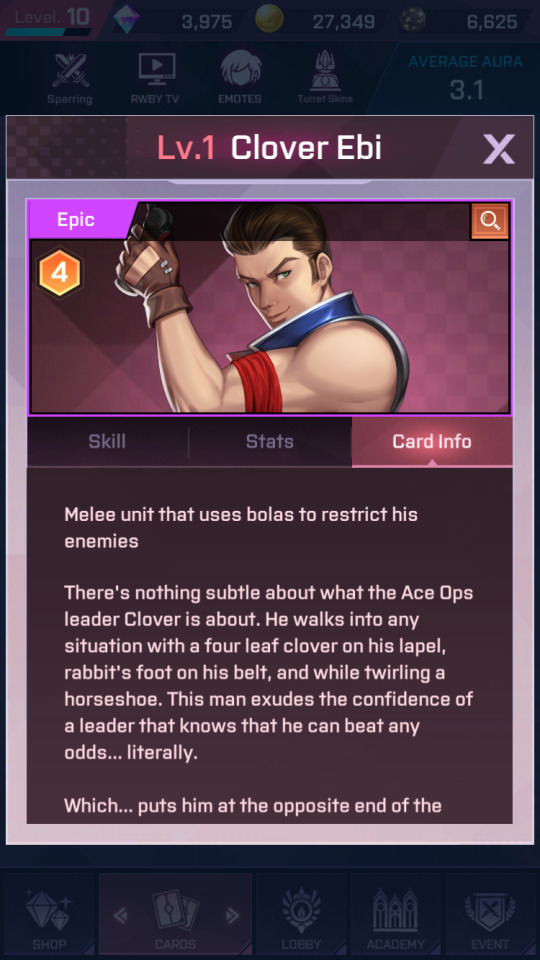
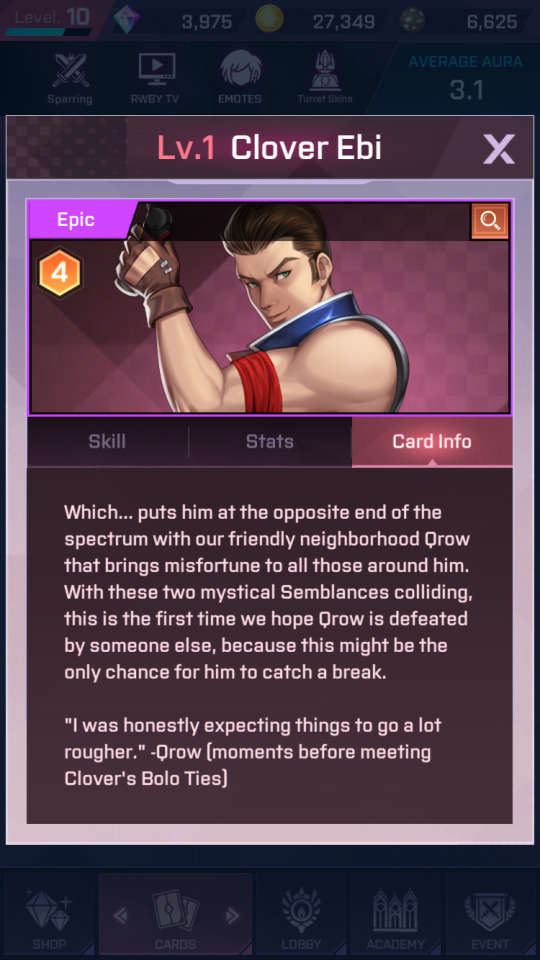
There are two things I want to point out about this description that I want to touch upon here.
First, “there’s nothing subtle about what the Ace Ops leader Clover is about.” Now, that’s not to say he has no hidden depths to his character (It would really suck if there wasn’t any more to him), but I feel like these few words communicate a lack of secrecy as to his values, personality, and alignments. Can having all three of these things be positive still amount to a villain? Sure -- you can kind of say that makes him like Hazel in that regard -- but I think my next point will solidify that’s not the case.
Second, I’m gonna make this one short and sweet. There is no way to basically say that ‘this new character (Clover) is going to kick a beloved protagonist’s butt (Qrow’s butt) and that will be a good thing for said protagonist,’ and then have that new character end up being a baddie. While my knowledge of the game is a limited since I don’t actually play it, I did do some research today, looking at various cards for both protagonists and antagonists, and they overwhelmingly geared the framing of these card descriptions towards a more hero-focused outlook on the characters. Basically, this game is not about to cheer for a hero like Qrow to be defeated by someone who will turn out to be a villain, if for no other reason than it’s a poor choice for the game’s long term posterity.
But just in case that card’s second-to-last line left anyone with lingering doubts about its intentions, the RWBY Amity Arena Twitter page was kind enough to elaborate on it!
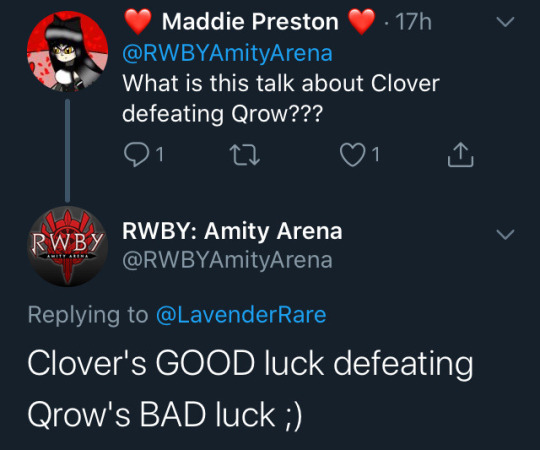
I feel like that wink emoji should be doing my work for me here. If there was ever a doubt as to the intention of the wording, this tweet should clear it up. Clover is so clearly being shown by the Amity Arena card as a positive influence on Qrow’s life, and in a way that implies that that’s not about to change anytime soon.
Like, if they wanted to convey ambiguity as to Clover’s moral alignment, they could’ve just said something along the lines of “Who knows,” or “Guess you’ll just have to wait and see.” In the world of Remnant, ambiguity is a force more powerful than the Light and Dark Gods combined, and one that knows no shortage of uses! But no, they literally spelled out that line’s intended meaning, with inflections and a winky face to boot!
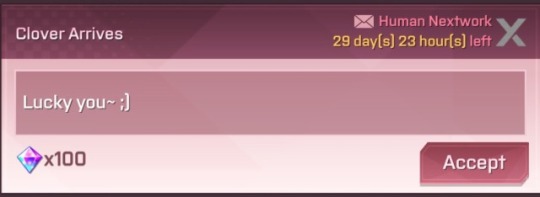
I’m not going to try to go into detail about all of the little intricacies of this reward card, because someone already did it for me! I direct you to this AMAZING analysis by @scathing-eyes where she highlights both what this single message has to say about Clover and Fair Game at large.
3. Introductory Card on Twitter
Thank you so much to @homokinetic for linking me to this card!
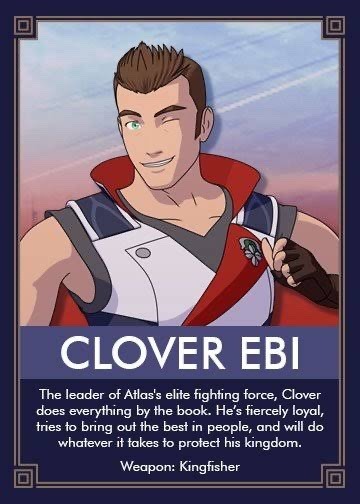
If you’re trying to depict a shady character or even one who you have twisted intentions for, this is not the description you use for them. Here, we’re not given soft and vague allusions to Clover’s allegiances that could imply sinister motives. We’re told flat out that Clover acts in the best interests of Atlas and does things by the book. I mean honestly, that second point should de-trigger any alarm bells because Salem...doesn’t really have a book. I mean, she has goals, but as to how they get done? She doesn’t care! But Clover and Ironwood care about doing things by the book because they feel like those rules, for as flawed as they are, are what will keep the world from succumbing to chaos (Whether they’re right or wrong...look, I love these two, but they are flawed -- not evil, but flawed). Salem, on the other hand, worships the idea of chaos since it makes her goals that much easier to fulfill.
I think the line “tries to bring out the best in people” is also important. Salem’s forces gain strength by exploiting the worst qualities in people, and Clover stands in stark contrast to that philosophy by focusing on nurturing their best qualities. This is well communicated in the series with his actions towards Qrow and the introduction to the routines and options that the new Huntsmen now have access to. Not only that, but those means of nurturing come down to themes of unity and order (Showing Qrow the benefits of working with others and taking pride in his accomplishments, showing the new Huntsmen the positive ways they can impact Atlas, encouraging them to take a night to refresh their spirits), literally the very outlooks on life that Salem seeks to obliterate in order to ensure that humanity will be destroyed again. Just in terms of philosophies, Salem’s team and Clover are so fundamentally different in ways that just aren’t compatible. It’s not like Clover and Qrow where their differences complement each other and can mutually benefit the other. There is no way that Salem can benefit from posing a figure that inspires the endurance of the better qualities of the human spirit in a position of power.
4. The Overall Lack of Narrative Sense in Making Clover a Baddie
Clover is a character meant to foil and relate to Qrow. That’s not even an opinion. Everything from their contrasting semblances to their scenes together cement that as an absolute fact, and whether you ship it or not, their connection just can’t be ignored.
All that said, while Clover is an important part of this duo (Duh), it’s Qrow who is the focal point. Qrow is the character we’ve spent four seasons with and watched him struggle and develop through his journeys. So it’s fair to say that the impact of Clover and Fair Game on his character (Again, whether romantic or platonic) will be something that will significantly impact the direction of Qrow’s character going forward.
The next logical question, of course, is as follows: What’s the narrative point of Clover being a baddie for Qrow’s character? @skybird13 wrote a fantastic post about the overwhelming benefits of a genuine Clover as opposed to the redundancy of a Hans-esque traitor Clover storyline. You should absolutely read this post, but I’m going to quote the segment that spoke to me the most.
“I think the most surprising thing RT could do with Clover’s character at this point is to let him be exactly who he seems to be. Should he have his backstory and his secrets and his own demons to deal with? Absolutely. I would love to see that. But when it comes to Qrow’s trust in others, I think that has been pulverized enough throughout the series. Putting him through it again serves no narrative purpose except to send him right back into the tailspin that he’s currently digging himself out of which, in all honesty, isn’t great writing.“
And yeah, I have to ask: What point would another stab at Qrow’s trust do? If Qrow was meant to be a character who would face a tragic end, then why didn’t he back in Volume 6, when it would’ve been infinitely more appropriate? He literally lost faith in the person he dedicated his very life to. Why show Qrow recovering from his low point and building him up in Volume 7 just to tear him down? Unlike a character like Ruby, someone young and idealistic who watches the conventions of trust and goodness in her life crumble before her eyes over and over again and grows from it as she discovers new things about herself and others, Qrow has already had a lifetime’s worth of those ideals crashing and burning, and we’ve already seen the results of that growth, both on the high and low ends of his viewpoints on life, but especially the low points. What is the point of returning him there that couldn’t have been more naturally done but one volume earlier?
The Conclusion
...I’m bad at ending things. But I know I’ve made my case, and I’ve made it about as well as a case like this can be made.
Rooster Teeth, through both its primary and secondary means of storytelling, have made a strong case for a Clover who will remain loyal to the betterment of Remnant, regardless of the path he personally chooses to get there (Joining Robyn vs. Staying with Ironwood). For them to change gears after all this setup and make Clover an ally of Salem would be frankly nonsensical after all of this careful buildup.
Could it turn out that I’m wrong? Of course, but despite the suspense in my heart, I can’t help but trust RT here. Maybe that’t the result of that bop of an intro. Maybe it’s the prospect of my new ship becoming canon. But I don’t think that trust -- while based in emotion -- is baseless, and if RWBY has a theme, isn’t it to have a perspective like that?
So here’s hoping the Clover is just another instance of the payoff of trusting love!
103 notes
·
View notes
Text
re: carrot ironfoundersson and the power of his kingly charisma
i blurted this out like, directly into the discworld discord and it’s So Long but here
there's a reason vetinari, vimes, and a lot of other people in the city find him so like deeply frightening
and that's even while feeling such affection for him
carrot is in command of this natural charisma - people might not know he's a prince, but they feel there's Something about him, and his bright smiles and his warmth and his ease make everyone want to just do what he says, even when they start out as hostile to him it doesn't always work, but like, for him to have the success rate he does, and in ANKH-MORPORK? city of a billion ornery bastards?
and the thing is like, having that power...carrot could take the throne but more than that he doesn't need to take the throne
he has this authority where he can just go in and make things As He Thinks They Should Be and especially in the first few years, like... you can tell that he's on that line a LOT and vimes' narration particularly is very conscious of the way that carrot is on that line
the line between observing so that when something goes down, he can intervene as a copper and between stepping in and Changing Things, Changing People, so that he doesn't have to intervene, because whatever you say about vetinari, he never does that, not directly
he changes the situation and he changes it again and he changes it again, so that broadly, people can choose. people choose convenience, people choose, broadly, to live in relative harmony, people choose the society that's increasingly helpful to them - with the post office, with the train, with the hospital, etc etc
instead of choosing infighting or brawling or murder
but carrot isn't that subtle, you see, and the thing is like Carrot's instinct is always "I can make people be Right" before it's "I can let people be Free" and he resists that instinct! he knows it's not the right one to have
and I think it's a genuine struggle that he has, especially when he sees the world in such black and white terms
but yeah, the fact of the matter is that that power is always at his command and like the thing is?if he was on the throne - or if he was commander of the watch - if he was visibly in charge
he could still do it and do it easily
vetinari has this weird transparency but also everything happens behind closed doors, but carrot? if he were king or if he was commander of the watch like
he could kill someone in the street and it's not that people wouldn't care, it's that they like carrot SO MUCH they'd justify it to themselves that he did it, before carrot even said a word to defend itt. hat's why carrot has to be so much more moral than anybody else - because people have too much trust in him but that morality has to be for him.
as soon as he starts forcing it on other people, like... it's too much power. it's too easy.
and i have to say like, based on what we see in the canon and the relationship that we see between vetinari and carrot, i wouldn't be surprised if they meet up once a week and talk about this thing specifically because like, vimes isn't great at communicating Nicely on big stuff like this? his mentorship is more of a catch-all thing and i think he finds carrot's specific charismatic powers too frightening to sit down and take them apart whereas vetinari can sit down with carrot, have a quiet cup of tea with him, and they can have this conversation which is...
carrot knows that vetinari is feeling him out to see if he has to have carrot put down, but vetinari knows that carrot is doing the same - they're both testing one another for corruption, because it exists in such spades in potentia.
but vetinari will tease things out and then repeat them back to carrot in a different context so that carrot can do these mental exercises which are hard for him to do himself? because he just hasn't got that kind of mind, the kind of “analyse my own feelings and morality” mind, and he really does need an external hand to search for ambiguities but tbh carrot... doesn't talk to anybody about his feelings.
not to angua, barely to vimes, not to any of the watchmen. there's a reason we donn't see his POV after G!G! - there's a storm going on inside that head, and he doesn't like to talk about it.
and i think often about like... the loneliness that he must feel, because i think a lot of people mistake Carrot’s literalism and his focus on things being as they should be for like, a lack of personal love? and that’s not true, it isn’t true at all, but like... the way his head works, the priorities are clean cut, and they have to come first.
if Carrot was still a protagonist in later books, I think people would fucking hate him, to be honest. People would say he’s too cold, that he finds complicated ethical decisions too easy, that he’s too unemotional, but none of that is true - it’s just that in the moment he acts,he does what he knows is Right, because he’s not like... got a complex enough mind to worry about Ethical Dilemmas. but after? Afterwards, when the emotion sets in? Or when he’s made the hard choice, the one that hurts him personally, but is good for others - especially when he knows how easy it would have been for him to make the other instead?
Oh, then I think he’s very emotional. but not for everybody to see. quietly, in his own head, or maybe down on paper. he’s very private about stuff like that - and indeed about everything.
carrot is just this character with so many layers who PRETENDS to be simple - and i especially love how he complements Vetinari, who does a very similar thing himself.
109 notes
·
View notes
Text
Review: Extraordinary You
Media Type: Korean drama
Genre: Satire, Horror, High school rom com, sageuk (yes it is all of these genres just roll with it)
Summary: A typical high school girl starts experiencing memory loss, and feeling out of control of her actions. As it turns out, she’s not a typical high schooler, but a character in a manhwa--and not even the main character! Will she be able to change the story, or will she be trapped in the role the writer assigned her forever?
Why you might care: You love meta jokes, stories about stories, debating the concept of free will and predestination, and love conquering all
Why you might not care: You like a show to be what it says on the package, and would be disappointed by a high school rom com that took a sharp turn into existential crisis. You’re tortured by ambiguous endings.
Trope Bingo! Reincarnation/past lovers (it counts!), love triangles, love conquers all, high school romance
If you liked ___: If you’ve already watched and loved this show, and are trawling the tag trying to fill the void, I recommend watching the first season (better as a stand-alone season!) of Westworld, another show that tackles these same questions.
~Spoilers and overall thoughts under the cut~
This was by far tumblr’s favorite drama of 2019, and for good reason! I also loved it, and have very few criticisms, as well as some points where I think the drama went above and beyond all my expectations.
Plot: The plot was engaging, high stakes, and excellently paced throughout the whole drama (I felt it sagged a little as it entered the final third, but that resolved again by the end of the show to finish on a really tense pair of episodes!). The writers didn’t sit on new plot developments until they wore them out, but instead kept the drama moving, while still giving the time and space for us to see the characters react to the plot (a crucial element that is often neglected when people try to write a fast-paced story!). The ending left a lot unexplained, but it felt like open-ended questions rather than plot holes, and I have no doubt the writers knew exactly where they were going from the beginning.
Central character(s): Eun Dan Oh is wonderful! Very much the main character, she holds this whole crazy story together with her incredible and varied performance. By turns funny, earnest, frustrated, devastated, optimistic, frightened, and head-over-heels in love, she feels as real as you or me. The actress is charming and charismatic, and I can’t imagine someone watching this drama and not falling in love with her. More importantly, Eun Dan Oh is a central character in the eyes of the plot. She drives the changes in the story, and the other characters revolve around her and her indomitable will. All of them are changed by her, and all of them are better people for it. Her own character arc is more subtle, since she doesn’t really change her opinions or beliefs much from the first few episodes (at least once she becomes aware of her set up). Instead, her journey is about finding the strength and courage to stay true to herself despite the increasingly painful barriers that she encounters on her way to self-actualization. The writers and actress together did a fantastic job with a character who is easily one of the best parts of this drama.
Romance: Here is where I felt the story was the weakest. This is personal taste, since I think it worked very well for most people, but I never fell in love with Haru the way so many other people on tumblr did. (This is NOT to say I thought she should have ended up with Baek Kyung--for obvious reasons that would have been Bad). It’s just that Haru had too little defining his personality and identity outside of Dan Oh for me to latch on to him--I cared about what happened to him exclusively because I loved Dan Oh, and she cared about what happened to him. For a romance to work really well for me, I need both characters to be fully developed people with outside interests and personality, and for a lot of reasons that made sense in-universe, Haru was not. However I was a big fan of the way the romance intersected with the other themes in the story, and I thought the writers did an excellent job integrating it that way.
Side characters/side plots: I loved so many characters in this story, and almost all of them were engaging enough to carry a show on their own! I’ve seen the idea of a second season focused more on some of the other characters, and I would be over the moon about that. Do Hwa, Joo Da, Baek Kyung, and the Dried Squid Fairy had stories that were as poignant and engaging as those of the mains, and they had their own arcs which were executed with skill and grace despite their more limited screen time. One thing I would have liked to see more of would have been interaction between the secondary characters and Eun Dan Oh, which tended to fall away once the romance really got going. It’s a testament to how great the actors were that I missed seeing their friendship so much!
Integration of secondary roles with protagonist’s story: This is a point where I feel that if a drama can’t succeed, it should cut the stories entirely. This show in particular does a really good job making its side plots not only engaging, but crucial to illuminating the themes of the story. Joo Da and Do Hwa’s story contrasts with Eun Dan Ho and Haru’s, and both of them are contrasted with the Dried Squid Fairy, as we see different people react to impossible situations. Their plot lines are carried throughout the whole show, and are concluded in ways that enhance the climax of the protagonist’s story. The drama would feel incomplete without these elements, which is far more than could be said for most drama subplots!
Tone: Now we come to my favorite and most elusive element of a show. If the show doesn’t hit the right notes for me here, I often just can’t love it no matter how good other elements are. On the flip side, I have watched some real messes just because I can’t resist a show with a strong sense of atmosphere and tone (Hong Sisters I’m looking at you)! Here is a place that Extraordinary You faced considerable challenges and pulls it off effortlessly. They needed to balance the light-hearted comedic moments with the darker, genuinely horrifying underbelly of the world they had created. To add even more complexity to the situation, they needed to communicate the different layers of story to the viewers visually and tonally. (One element I’ve commented on which was a real stroke of genius was changing the lighting in the “stage” to be darker and colder than the lighting in the “shadow,” communicating to viewers which type of scene they’re watching, but also conveying the themes of the show by making the scenes where the characters are puppets more tense than the ones where they are free to be themselves.) Simply put, Extraordinary You excels at tone. It is a masterclass in visual direction and balance, and never dropped the ball in this area, no matter how dark the show got.
Theme: A lot has been said and written about Extraordinary You’s themes, so I’m not going to try to cover everything (especially now so long after the show aired!). What I found so impressive about Extraordinary You was the way in which the acting, characters, subplots, and directorial choices served to explore and enrich the themes of identity, memory, and free will that are discussed in such depth and complexity in this show. Importantly (to me) they didn’t end the show on a hopeless note, despite the hopeless situation they had created. None of the issues are handwaved away, but the message that I got was that love was worth the struggle. Even if there’s no guarantee or even possibility of a happy ending, it’s still worth it to try. I love a show about the importance of love, in all its difficulties and complexity. It was clear from the first few episodes that the writers and PD came into this with something to say, and they executed beautifully. If you have any interest in these themes, (and somehow missed this show in all of the overwhelming hype for it) please check this out! You will not be disappointed.
#extraordinary you#reviews#This Show is Top Tier#lol its been months since this show ended but I'm still thinking about it#anyway here's my take on what went into making this show so successful
10 notes
·
View notes
Text
The Linguistics of Bumbleby II
Ok, here we go again, folks. This is the second part of a series of a few posts I’m doing, so although you don’t have to read the first part to understand any of this one, in case you haven’t already and want to look at it then you can find it here. Anyway, this one covers Volume 2 and Volume 3, so we’re getting into the really good stuff now. Enjoy 😉
PART THE SECOND
Here we have the other significant lines/conversations in the first three Volumes. I'm going to go through these in order to make things as simple as possible for myself.
One, “I love it when you're feisty.” Well, this is just self-explanatory. Yang delivers what can only be interpreted as a flirtatious line while pointing directly at Blake. It's... not subtle, and moreover there's no reason for it to be included except to let the audience know that Yang is attracted to Blake.
Two, the talk in Burning the Candle. This is often pointed to as one of the moments that really made Bumbleby take off, and it's easy to see why. The entire scene is extremely intimate, with Yang opening up to Blake about her abandonment issues which she has never been show to tell anyone else about, but there are a few details of the dialogue that I want to focus on.
“Just please, get some rest. If not for you, then for the people you care about.” This line reads a little oddly at first, and I sort of felt like it should be “[...] for the people who care about you” instead. But eventually realised that it does make sense in the context of what happens after, which is...
“And if you do feel like coming out tomorrow, I'll save you a dance” followed by a wink. Once more, this entire line could so easily have been removed or never added at all without changing the outcome of the scene if we were just meant to read Yang's intentions as purely platonic, but that's not the most intriguing thing about it. To me, this line reinforces the one I just mentioned above, in that both of them show Yang gently testing the waters—carefully hinting at the idea of something between them without forcing them to address it directly. She seems to think Blake might return her attraction, but wants to make her own feelings clear to see how Blake reacts. Lastly, the "coming out" pun draws the audience's attention to it more and makes it harder to miss or gloss over.
With that in mind, it seems more logical that she would say “[...] the people you care about” and not “[...] the people who care about you” in the previously mentioned line if she is trying to discover the nature of Blake's feelings for her rather than only disclose the nature of her own feelings for Blake. By subtly implying that Blake cares about her she is opening the door for Blake to choose what happens next, and we all know what that choice was given Blake decides to give Yang her first dance later in the episode.
Three, the talk at Mountain Glenn. Blake explains how she feels like the only thing her Semblance is good for is running away, and Yang counters that Blake is "not one to back down from a challenge." Her voice when she says this is... peculiarly soft, which only adds to the weight of the line, but mostly this is showing the viewer that Yang sees Blake's strengths where Blake only sees weaknesses. Yang expresses great belief in Blake here, which links nicely to...
Four, the talk after Yang's fight against Mercury. This addresses Blake's belief in Yang in the spiritual follow-up to the Mountain Glenn scene, and oh boy, is it rife with obvious romantic coding. Just for starters, it's the first direct parallel between Yang and Adam—i.e. Blake's canonical ex and her canonical future... well, I think you see where that's going—with Blake herself openly comparing them.
She says that she had “someone very dear” to her change—a curiously ambiguous term when she could have used “someone I worked with” or even just “partner” to contrast Yang and Adam's roles as her combat partner’s instead of their roles as people she's very close to on a personal level—but that Yang isn't him and so she chooses to trust her.
This clues the audience in that what connects Yang and Adam is their differences—i.e. the way they reacted when Blake confronted them about their violent act, one with gaslighting and the other with understanding and reassurance—not their similarities. They are opposite forces in Blake's life, and the show is informing the viewer of that now because not long after we arrive at...
Five, Volume 3 Chapter 11. This isn't just not subtle, it's setting subtlety on fire and then throwing it out of the window never to be seen again.
Adam declares that he will “destroy everything [Blake] loves”, basically the narrative equivalent of summoning whoever is most important to Blake, and of course the person who appears is Yang.
As if that didn't already go far enough, Adam then looks from Blake's horrified face to Yang and adds “starting with her”, beating the audience over the head with the fact that Yang is someone Blake loves.
I don't think I need to say any more about this. It's the point where the writing tied Blake and Yang together irrevocably, and there was no going back from it.
The summary of this second part can be mostly boiled down to: Blake reciprocates Yang's attempt to form a bond, but that bond is then tested to the full (in a common technique to show the audience how powerful a relationship is by almost breaking it).
Wow, well that was a more hefty section, because Volumes 2 and 3 had a lot to discuss, but hopefully it was still interesting, and I’ll see you all for the one or two remaining parts pretty soon 😊
#bumbleby#otp: bizzy buzzy friends#raven rambles about random details#alternative summary: it was gay before but now it's getting even gayer
179 notes
·
View notes
Text
How to Tell Left From Right
[ alternate title: The Not-Completely-Definitive Guide to Not Going Absolutely Fucking Mad (like I did) when You Start to Doubt Everything You Thought You Knew about the Symmetric Group. ]
So I knew that at some point, I would need to sit down and take the time to honestly figure this out. And I’m glad I did. But I’m really glad about, what I’m really looking forward to, is never, never, never, (maybe if I say it enough it will be true) never, never having to do it again. Only the prospect of possibly sparing another kind soul from this “exercise” has given me the strength to write up my findings into a post.
[ This post covers the work that I did on Day 16 of my ongoing journal. ]
------
This post concerns handedness, which is is an issue that arises frequently in algebra. For instance, a coset may be a left-coset or a right-coset, an action may be a left-action or a right-action, and an ideal may be a left ideal or a right ideal. In this post we talk about various choices that can be made for the symmetric group, and how to do so consistently.
We will assume the reader is familiar with the basics of the symmetric group: in particular, cycle notation and one-line notation.
------
The first choice to be made is how to multiply in the symmetric group. It is tedious to write down a useful formal definition of the choice here, so let us illustrate by example:
If multiplication in $S_n$ is defined such that
$$ (12)(13) = (132), $$
we will say that we are using the Functional Convention.
Conversely, if multiplication is defined such that
$$ (12)(13) = (123), $$
we will say that we are using the Operational Convention.
The names are intended to be somewhat evocative: the Functional Convention multiplies like functions compose, and the Operational Convention multiplies like you would type things into a calculator.
In the interest of full disclosure, I should mention that most textbooks will use the Functional Convention, simply because it’s a little less annoying to write out formally.
[ Notice that these are really conventions about multiplications: although there may be ambiguity about what $(25)(24)$ means, there is never any ambiguity about which permutation $(1354)$ refers to. Actually: these are really conventions about non-commuting multiplications, since even $(1354)(26)$ is unambiguous. ]
To convert between permutations in cycle notation and in one-line notation, it will help to think about group actions. There is another choice to be made here, acting on the left or the right, which is somewhat more subtle.
You may suspect that the choice to act in one direction or the other is determined already, morally speaking, by looking at the regular actions. But this is not true: the left- and right-multiplication determine perfectly good left- and right-actions, respectively, under either the Functional Convention or the Operational Convention.
Instead, consider the following observation, whose proof is straightforward:
Proposition. Let $A$ be a set of $n$ objects, and let $L$ be the set of lists of length $n$ using each object in $A$ exactly once. Then the maps $S_n\times L\to L$ given by
$$(\pi, a_1\cdots a_n) \mapsto a_{\pi(1)}\cdots a_{\pi(n),} \qquad\text{and}\qquad (\pi, a_1\cdots a_n) \mapsto a_{\pi^{-1}(1)}\cdots a_{\pi^{-1}(n)},$$
are respectively left and right actions of $S_n$ when using the Functional Convention; and are respectively right and left actions of $S_n$ when using the Operational Convention.
(If you wish to write the proof, it may help your sanity to observe that regardless of what Convention is being used, $(\sigma\pi)^{-1}=\pi^{-1}\sigma^{-1}$ remains true.)
You may think that the first class of actions is more natural than the second based on the notation, but both are natural when viewed from the lens of examples. In fact, arguably the second is more natural than the first.
[ Note: we are about to write down examples, but I will assure you ahead of time that we won't be multiplying group elements in these examples--- so it should cause you no alarm that we write both classes of actions as left-actions; simply choose Functional when using the first class and Operational when using the second. ]
The first class, i.e. the one where
$$(123)\cdot abcd = bcad,$$
may respectably be called the Replacement Convention, because, for instance, the element in the first position has been replaced by the element in the second position.
Conversely, the second class, in which
$$(123)\cdot abcd = cabd,$$
may respectably be called the the Dynamic Convention, because, for instance, the element in the first position has moved to the second position.
When $A=\{1,\dots, n\}$, the set $L$ in this proposition is identified with the set $S_n$ of permutations by considering them as elements in one-line notation. With this new language, we can rewrite the proposition in somewhat more “prescriptive” form:
To obtain consistency in the left-action, we must either use the Functional/Dynamic Conventions, or the Operational/Replacement Conventions.
To obtain consistency in the right-action, we must either use the Functional/Replacement Conventions, or the Operational/Dynamic Conventions.
[ Before you rush to tell me: I am very acutely aware that this looks backwards. I am very accutely aware that this looks inconsistent with the proposition. It is neither. Dear goodness, I wish it were. ]
In particular, the somewhat annoying conclusion is that you cannot produce a setup so that both the left and right action are consistent. But for me, the most important takeaway from this theorem is that
Functional/Replacement/Left is not a consistent choice of conventions.
These are the three that I would naturally gravitate to: Functional for reasons I have already mentioned, Left because functions act on the left (I know that postfix notation exists but English is an SVO language so that’s how my brain works), and Replacement because it has a moderately nicer interaction with one-line notation.
------
It is worth noting two hidden conventions, if only to dispell doubts that they have been ignored:
First, that the identification of $L$ with $S_n$ is not natural: one-line notation is, itself, a convention. In particular, we usually interpret $4312$ as $(1423)$ since there is a $4$ in the first position, a $2$ in the fourth position, and so on. However, in the spirit of the replace/move observation: we may also reasonably interpret $4312$ as $(1324)$ since the $1$ has moved to the third position, the $3$ has moved to the second position, and so on.
It is worth noting that the usual one-line notation is superficially consistent with the Replacement Convention, e.g. $(123)=2314$, and in the Proposition’s action, $(123)\cdot 1234 = 2314$. However, there is no "real” consistency issue with using the Dynamic Convention: you simply must be careful about distinguishing between the action on lists and multiplication of group elements. In particular, this distinction need never come up if you always write permutations in cycle notation.
(You might think to show that the usual one-line notation is more natural by appealing to two-line notation, but two-line notation has its own convention issue: does the top permute into the bottom or does the bottom permute into the top?)
Second, we may say that the actions from the Proposition follow the Positional Convention, because $\pi$ acts on the positions: for instance $(123)\cdot 4312$ is either $3142$ or $1432$, respectively. However, we could instead choose to let $\pi$ act on the \emph{numbers}, resulting in the Numerical Convention: $(123)\cdot 4312$ is either $4123$ or $4231$. Note that even with the Numerical Convention, the justifications for calling $4123$ “replacement” and 4231 “dynamic” are still valid.
[ Full disclosure: I haven’t checked what happens if you go full-bore with the Numerical Convention, but you will notice by going through some examples that everything else pretty much just changes whether a given representation corresponds to $\sigma$ or $\sigma^{-1}$, whereas changing Positional to Numerical actually does something more substantial. It is hard to believe that the entire scheme collapses if you change to Numerical, so I worry that I am missing some substantial convention elsewhere. ]
#math#maths#mathematics#mathema#group theory#permutations#notation#combinatorics#advised reading#but actually FUCK#5h#O.O#0p
9 notes
·
View notes
Text
All You [N]Ever Wanted to Know about the Biology of Freeza’s Race. . .Probably

Disclaimer:
I will begin by saying that I feel it is in poor taste to explain world-building outside of a narrative because that is something that should be achieved within the narrative itself (however subtle or apparent it might actually be).
Still, this particular topic is a popular one and so many of the private questions I get are in relation to it that I feel I should post something, if for no other reason than to establish a precedent that yes, I do come up with this crap on my own. I’ll still address it, just as I intended, within the story itself, but I thought an infodump might be fun. After all, it’s going to take me years, at my current pace, to tell the entire story.
Finally, I post this only because this is the type of thing about which I geek out (but only to a certain point). I say it all in good humor and with a gentle reminder that we’re talking about a universe with energy blasts, flying people, and filthy wish dragons. Being legitimately mean-spirited about disagreements regarding fictional characters, their anatomy, and so forth? GTFO. ^_^
Oh, and hey, if this sort of rambling appeals to you, or if you just want to read some Freeza fanfiction, you can follow my webcomic here~
My Background: I’ve been an animal geek since I was a child back in the (gulp) 80s. I loved to read nonfiction about creatures and watch nature documentaries. That love has never died. I had nearly every type of pet of growing up but my first love was always reptiles.
Like so many who shared a fascination with the beings who inhabit our planet, I assumed that I would pursue a career in veterinary medicine. On two separate occasions, I sought out veterinarians to shadow professionally and both times, I knew that it wasn’t the field for me. Oddly enough, it seemed that one would need to adopt a sort of callousness (compassion fatigue) to survive in the career. Animal abuse and neglect were more common than I could stomach; I hated the idea of having to develop that sort of attitude just to do my job.
Despite choosing a different career path, my hobbies continued to reflect my interest in animals: dog obedience, animal training/behavior, equitation, falconry. . . the list goes on. As an undergrad, I worked as a department lead for one of the few pet store chains that has some integrity, e.g., spending hundreds on surgery for something like a six-dollar hamster in our care was not unheard of.
Specifically, I worked in exotic pet care and I was the go-to person for herps (reptiles/amphibians) and psittacines (parrots). I am by no means an expert on the level of a focused biologist in the field. I offer this information only to show that the biological decisions I’ve made in representing a fictional, alien race come from at least (some) experience and study.
Arcosians: Before someone gets their panties in a knot, I’ll touch on the name I use to denote Freeza’s race. For everyone who points out that “Arcosian” is exclusive to the Ocean dub, yes, I know. To anyone who says that the aliens depicted in this filler, who first contract the saiyans, are not the same race as Freeza’s clan, yup, I agree with you. Freeza didn’t even exist as a known concept when that was animated.
I had to pick a name to avoid being catachrestic. Clunky phrases like “Freeza’s clan” and “Freeza’s race” are jarring to the ear.
When I first entered the fandom, most people called them either Icejins or Changelings. “Icejin” makes my inner etymologist squirm (though this is the term I still use when talking casually). “Changeling” denotes something else.
“Arcosian” and “Arcos”, even given the source, have been the most satisfying choice for me. Rest assured, I don’t personally get hung up on anyone using the other terms (or having different head-canons, in general). If we can follow what the other person is trying to communicate, there’s little point in being pedantic (and it tends to reflect more poorly on the person acting like a dick than the person who is “wrong.”)
Commonalities:
Sexes:
For storytelling purposes and for simplification, I stick with two (male and female). It’s boring and uninspired but I can work with it without having to spend a lot of time establishing new information. Hermaphroditism in higher species is rare and while there are some instances of intersex in reptiles, I wasn’t interested in trying to focus on this.
Omnivorous:
While you get the occasional, herbivorous oddballs like uromastyx, many reptiles are carnivorous/insectivorous. You get omnivorous species as well so depending on which creature you’re using as inspiration, there’s a lot of room to make up information for a fictional species that shares reptilian attributes. I imagine that Arcosians are primarily fish and meat eaters. Veggies aid digestion. Fruit is a treat. Grains would be the least tasty meal for them.
Noises: The only reptilian noise I’ve adopted is “purring” and this is loosely based on crocodilian behavior that males use to attract mates and establish territory. I’ve taken some major liberties with this one in that it’s used as an involuntary indicator that a male of the species is feeling especially amorous. Look for it to be used for comedic effect later.
Scents: Those big eyes in the center of the face typify predators and the Arcosians are no exception. While primarily a visual species, there will be some instances where scent comes into play, particularly in a breeding behavior involving scent glands under the tail and an ability to perceive female receptiveness (in their own species and in some others). Have you ever wondered why human females are discouraged from owning male iguanas? It’s not pretty on the rare occasions that something goes REALLY wrong. <.<
Oviparous: Honestly, I think it’s more likely, given some of the dissimilarities I use, that Freeza’s race would bear live young (like some reptiles). I needed them to be egg layers for a narrative decision that won’t become apparent until much later in my story. I did take advantage of this though and go with the tendency that some reptiles have their genders determined by temperature during incubation (so these fancy aliens have the technology to choose the sex of their offspring by the time Freeza is born).
Dissimilarities:
Sexual dimorphism: This is the fancy way of saying that males and females can be visually distinguished from each other and in a way more telling than having a look under the tail. I wanted to play with this a lot more than I ended up doing but the key difference I use is that black lines on the face are a male trait (perhaps serving a similar purpose as those on a cheetah) while colored markings under the eyes are a female trait. Defined lips are a masculine trait.
Bio Armor: I waffled on this for a while because of how ambiguous Freeza’s first form looks in terms of being either organic or technological. I ended up going with the former which seems to be the common head canon anyway.
Endothermic: This is the fancy way of saying they’re warm-blooded. The simple explanation is that Freeza has proven he can survive in space, though I imagine he would adopt a defensive state of torpor, even when healthy, i.e., not cleaved in two. Surely he should have SOME vulnerabilities, right?
Most of the fandom assumes the species is cold-blooded but here’s the fun factoid that many don’t seem to know: cold-blooded animals DON’T sweat. More specifically, unless I’m forgetting some exception, only mammals sweat (and not all mammals do).
While the similarities between reptiles are intentional, I also don’t want to be TOO on-the-nose when it comes to drawing those similitudes. Toriyama (likely unintentionally) establishes that Freeza’s species shares mammalian traits (apart from other physical similarities, of course) by making him sweat like a pig in his fight with Goku.
Mutant traits: “[Cold and Freeza] are the only ones [of their race] who possess an abnormal level of battle power and cruelty”—so said Toriyama in an interview about Bardock. I treat most Arcosians as being comparable to strong humans—they can’t fly, manipulate energy, etc. I decided to make transformation a purely mutant trait as well. There are elements of Freeza’s suppressed forms present in other OCs of the species but this is solely because I wanted to better differentiate characters.
Asexuality: From the same Bardock interview, Toriyama commented that Freeza was born from his father alone. In context, the phrase modifies Freeza’s traits as a mutant. Did Toriyama actually mean that the species is asexual? Maybe? Probably? It would be fitting for a perfect life form but at the end of the day, there just aren’t a lot of female characters in DBZ. It would not surprise me if this were a potential means to include procreation without needing to include another character (which Toriyama has certainly done in the past). Still, I’m ignoring the hell out of this, regardless of intent/correctness, for narrative reasons.
"Biogems”: I haven’t yet decided on a specific term to indicate the shiny carapaces that sit on the heads, chests, forearms, shoulders, and shins of some Arcosians. But you know what I mean.. . I’ll probably just continue to say “carapaces.” I had some fun with this one and I imagine that these are something wholly alien about the species. They serve to regulate body temperature in all parts of the body and protect important organs (namely the brain and guts). For the chest bit, I used a bit of bird geekery: it will also serve as a brood patch during natural incubation.
Genitals: (because everyone loves the naughty bits). I don’t have an established head canon on how their junk looks. The NSFW stuff I draw varies and will likely continue to vary unless there is a lot of interest in seeing an 18+ version of the steamy scenes (at which point I’ll commit to a design). Until then, expect to not get a clear look in the public version of the comic.
All I can say is that the males keep their equipment stored in the base of their tails until it’s needed (just like most reptiles). I did have a laugh about giving Freeza some hemipenes or some other type of weird-looking reptile gear (and boy, is there ever some out there) but if push comes to shove, don’t expect something too alien.
I think that covers it. . . Did I miss anything? Let me know your thoughts. And hey, if you like this sort of thing and want me to do more, let me know! Otherwise, I’ll be content to keep quietly turning out comic pages. :3
39 notes
·
View notes
Text
PART 4
Utena has turned into a car.
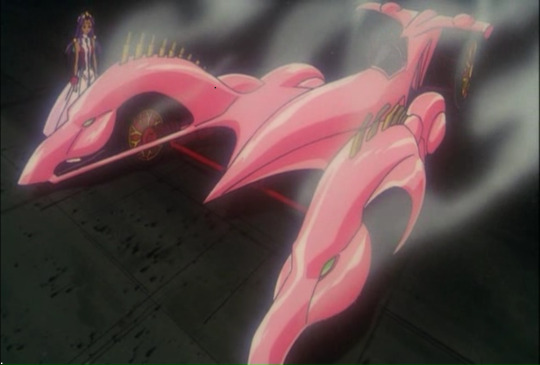
I think it is incumbent on the viewer at this point to try to unravel both why this makes sense as a gesture and why it seemed like a good idea at the time.
Point 1: It’s a magical girl transformation sequence. Ikuhara, having worked on Sailor Moon, knows all about this stuff. The beats of a transformation sequence are as follows: upon activation of an arcane device, a girl loses all her clothes and emerges clad in fetish gear. The ideal transformation sequence from a commercial perspective ends up with a girl wearing an outfit which appeals as much to young girls as it does to grown men. As has previously been established, grown men like cars – but this car is hot pink, shaped like a uterus and is trying as hard as it can to be a horse. Or two horses. It is a “car” in the same sense that Sailor Moon is a “high school girl”. It has been optimized to serve all of the needs of the academy at once.
Point 2: What we are dramatizing here is the fact that despite her avowed wish to leave the academy Utena has still been socialized in patriarchy and therefore cannot fully transcend her status as a player of the academy’s game. When she took Anthy’s hand and led her in the general direction of “out” she was still playing prince, saving the damsel in distress. This gesture does not work because the academy owns it. When she attempts it, she is revealed as what the academy forces her to be: an object. An exciting, ambiguously-gendered object, admittedly, an object which is absolutely up to date and this year’s model, but an object that is nonetheless made to please a particular audience. As long as Utena can still be the receptacle of male fantasy – as prince or princess – the story cannot work.
Point 3: Back in the old academy Anthy’s role in the final confrontation was to get stabbed a whole lot and lie in a coffin. Of course, something important and transformative did take place there, and the gesture that changed the academy did come from Anthy in the end; but she didn’t look cool doing it. Utena did all of the on-screen work. If Anthy is retelling the story here she wants to emphasize that despite all of Utena’s princely self-sacrifice the most difficult thing anyone did in that room was reach out of that coffin. She also wants to emphasize that she’s the top.
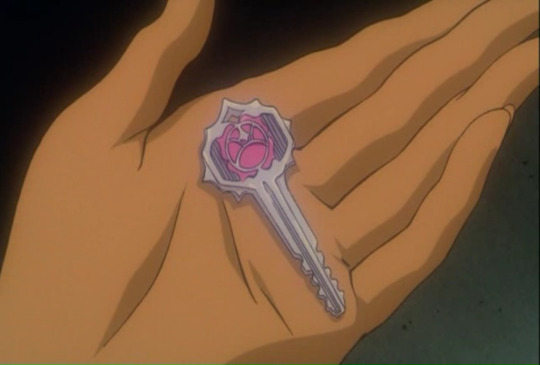
Akio killed himself earlier because he was unable to find his “key”. He lost it when he realized that Anthy was, if not enjoying herself, at least tacitly “consenting” to what he had been doing to her, which was, as far as he was concerned, not nearly as hot as the whole drugged princess routine. Anthy, however, already has Utena’s key. Get it? What we are emphasizing here, in case anyone got the wrong idea from the TV-mandated chasteness of the original series, is that queer desire is actually an integral part of the revolutionary moment. Anthy is able to go through with this because she really, sincerely wants to fuck Utena’s brains out.
So Utena’s sex car is saved from rusting away from disuse. The shadow puppet girls arrive to give Ikuhara’s old buddy Anno a shout-out and the race is on.
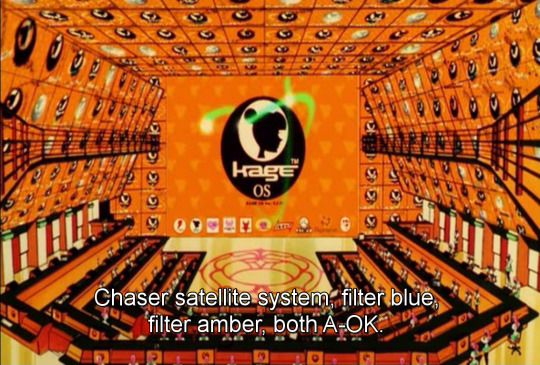
It’s worth considering whether there might have been a way to do the car metaphor without going full bananas zany with it – whether we might have found some kind of tonal harmony between Touga in the cabbage patch and Anthy in the driver’s seat. It would probably not have worked but I would have loved to see an attempt. As it is, the narrator has gone manic and we are flying, buddy, we are up in the clouds.
The shadow puppet girls (who apparently all have pink hair in this universe – emphasizing their artificiality, I suspect) complete their setup and a new challenger enters the race.
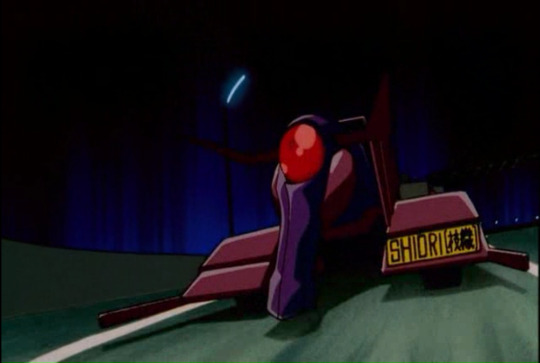
Shiori’s car looks kind of like Soundwave from Transformers. I always liked Soundwave. Her car is also considerably more phallic than Utena’s, having as it does a cycloptic bull for a figurehead. Shiori is acting as an agent of the academy here simply by making this a race, rather than an obstacle course - the idea that only one special person gets to leave the academy at a time plays right into the prince/princess narrative. It’s not a part of the story that Anthy particularly wants to dispel, either, which may be telling.
Shiori says the line of century, which I’m going to render literally for maximum effect: “It’s a big mistake to think that you were the only one who was able to turn into a car.”
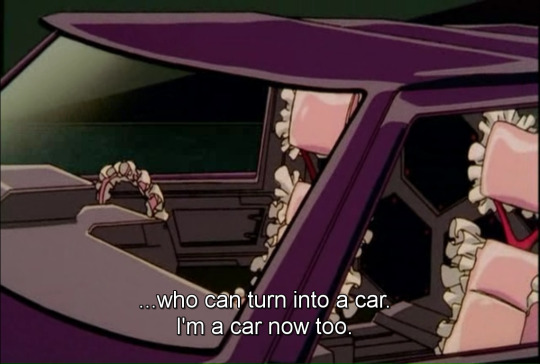
Behind the bull Shiori is a big ol’ Chrysler station wagon with frilly upholstery. She underscores the crabs in a bucket motif by saying that only she is cool enough to do something as neat as escaping the world before crashing into a retaining wall and exploding in a completely unforced error, which makes sense when you consider that nobody’s driving her.
Anthy has a nasty sense of humor.
Next up are the thousand drone tanks of the world’s resentment. The jokes are flying thick and fast now – the shadow puppet girls pick up the encroaching horde on a “vegetable scanner” which superimposes the danger on a picture of a salad, and the three filler dudes who were so fillery that I never mentioned them once in my recap of the original series show up with radar guns. The drone horde also makes a lot of really high-pitched honking sounds. The director wants us to know that he knows that this is stupid. The viewer may well ask what all that trauma from before was about, in that case, but there’s no time, the drones are attacking.
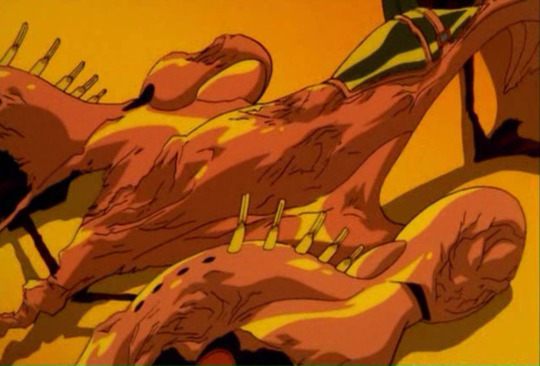
Utena’s chassis is effed up in much the same way that her uniform was back when she fought Touga that one time. Like the opening theme says: “what I want is to find my place in life and my self-worth, taking who I've been up until today and heroically stripping her down until she's bare, like the roses whirling in freedom.” Cast off that magical girl fetish gear, and be free! And nude. While we continue to film you. Trust us, it’s all very liberating.
Just as our heroes are about to be splatted by the biggest drone of them all, a tow hook shoots out from nowhere. It’s our heroes’ friends! Or… people who we can assume they made friends with, off screen, at some point!
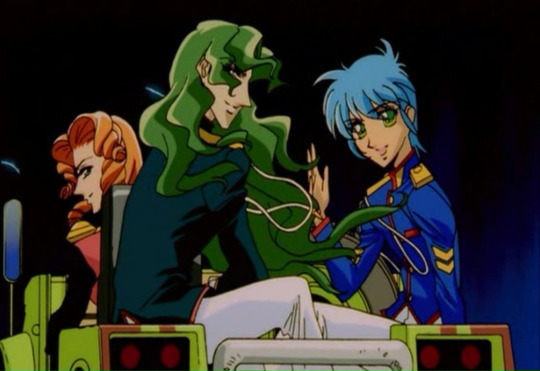
Ikuhara shouting in the distance: “Oh, the whole bandminton game thing was too subtle for you, huh? Need to have everything spelled out for you, huh? FINE”
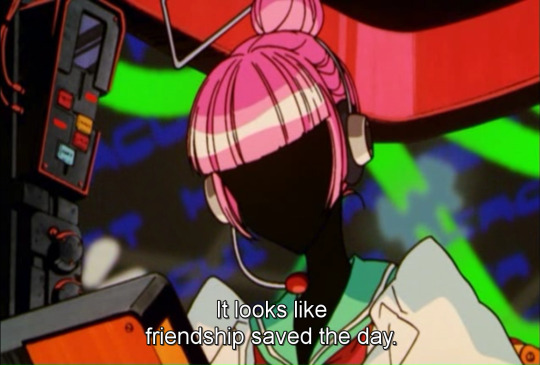
They are driving Wakaba, a Jeep. (The utility vehicle is truly the plain friend of the motorsports world.) Explaining their presence, Juri says that high ideals attract noble companions. (I like overtly conceited Juri, and wish her incarnation from the original academy had had a little bit more of that going on.) Miki tells Anthy that they will definitely follow her outside at some point. I do not believe him.
The final challenge approaches. It’s a giant Disney castle on wheels.
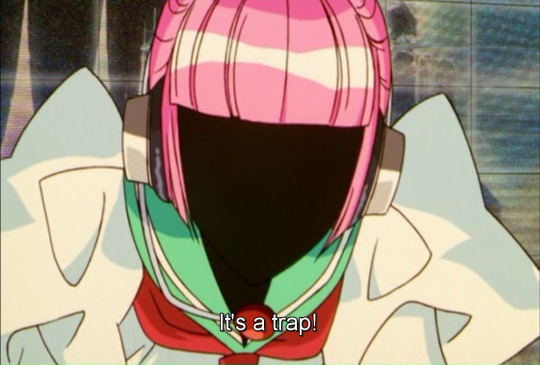
Thanks, Ikuhara. I am beginning to see a Point 4 emerging to complement points 1 through 3 above, straight from the director: “If I make this as shiny, noisy and overt as possible, maybe you idiots will pay attention this time.”
The castle hoves massively into the lane in front of them as somewhere in the distance the bongo player goes nuts. The shadow puppet girls implore Anthy to turn around and head back, but she’s not running anymore. Suddenly, the car is wearing a dress. Car Utena gets a secondary transformation - like, that wasn’t even her final form – like, you got your DBZ in my Sailor Moon, you got your Sailor Moon in my DBZ – like, we are now somehow even more uterus-shaped –
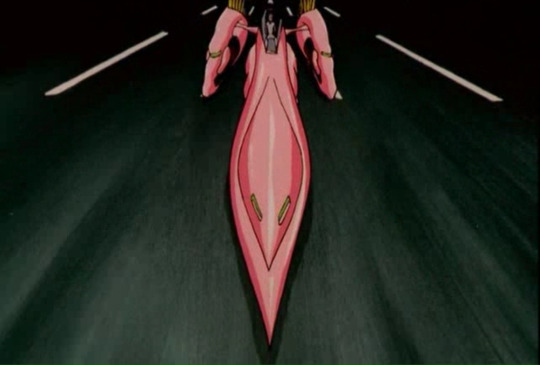
The extended dance mix of Rinbu Revolution starts playing, and let me just say that it is an incongruous choice for a car chase/demolition derby. Anthy makes it through the castle, to general rejoicing, but there remains one final obstacle.
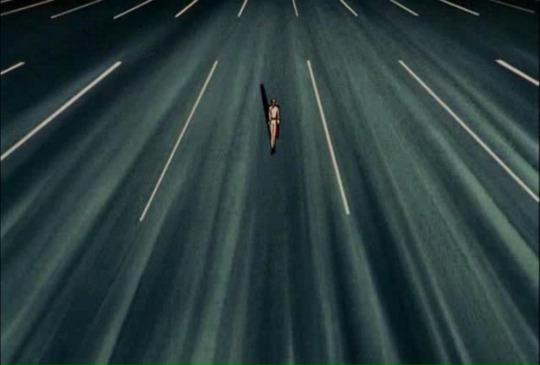
Point 5: to make all this masculine bullshit appear as silly as possible.
Akio tells Anthy that if she goes out there all she’s going to find is the end of the world. Which is true, of course – the point of the whole castle palaver, the point of all this fetishizing of youth and innocence, is to keep death at bay. If you can’t grow, you can’t die; but of course if you can’t grow, you can’t live, either.
Akio tells Anthy to go back to being a living corpse. (He can’t find his key, otherwise.) Anthy tells him to fuck off so he squeezes them between some giant tank treads.
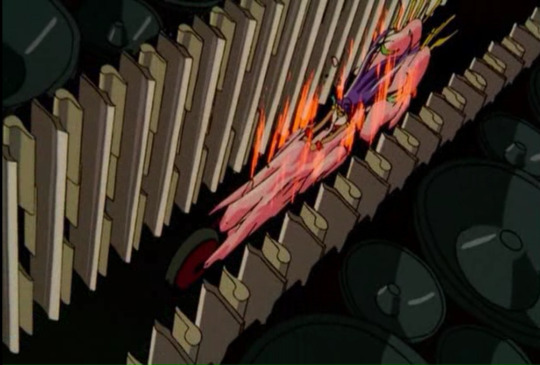
Utena there, getting denuded again, of course.
Then this happens.
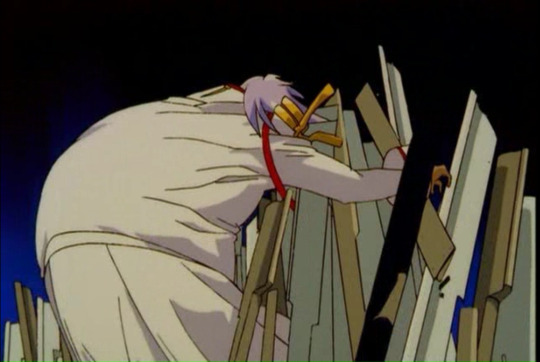
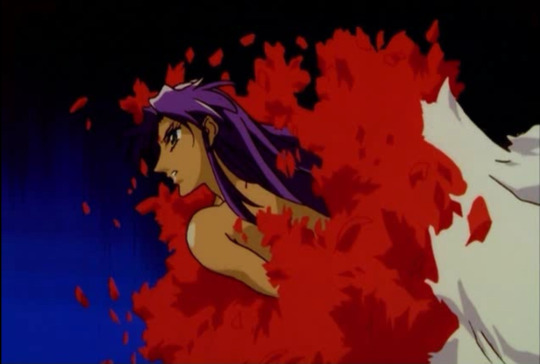
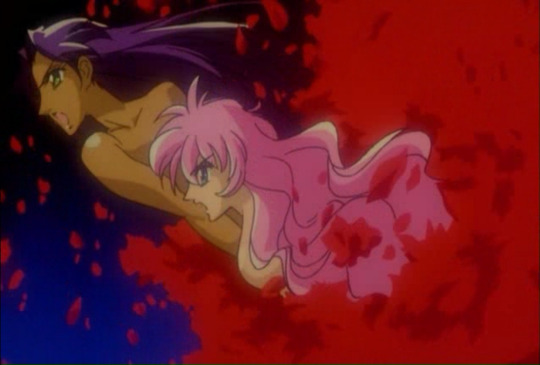
The prince is very, very dead. The castle collapses in a hail of rose petals and eurodisco. The shadow puppet girls lose their animating essence and become straw dolls named “Tenjou Utena” and “Himemiya Anthy.” Cause they were puppets the whole time, see?
“Real” Anthy and “Real” Utena chat about how there are no roads in the outside world and so they will have to make one themselves. They say this as they are literally driving on a road. Still on screen and still being filmed, the two girls recline naked on a speeding motorcycle and make out, as you do once you have been freed from the male gaze.
We end on a shot of another castle in the distance, which seems like a hopeful sign but should be the most ominous fucking thing in the world, if you’ve been paying attention.
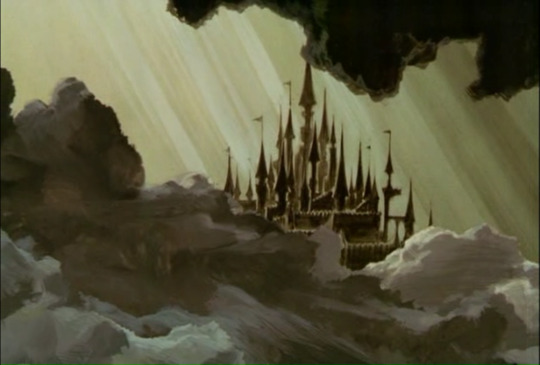
The only possible conclusion is that they have not actually escaped.
In the end I can only interpret the last act of this movie as a titanic shrugging of the shoulders, an admission of a failure to envision what escape from this milieu actually looks like. In this failure it invited other authors to take a crack at the same problem using the same kind of symbol language, which is how we got Madoka and its “let’s reframe choosing to be the Bride, who is still absolutely necessary to the functioning of the universe, as a revolutionary act in and of itself” thesis, among other things. Ikuhara has a lot to answer for.
The problem of course is that a genuine escape from the academy should probably not be written by someone who has a vested interest in the academy’s continued existence; and so I think if anyone does end up writing the Utena story with an ending that works, it won’t be Ikuhara, or, not to put too fine a point on it, dudes generally.
Then again it’s possible that outside the academy there are things besides writing and rewriting the same old story to worry about.
238 notes
·
View notes
Photo
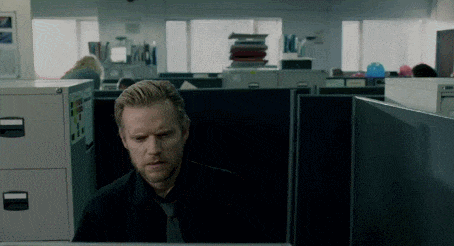
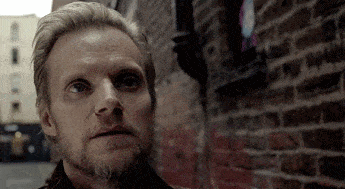
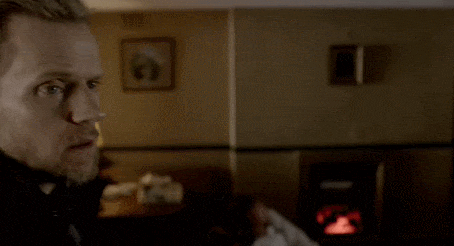
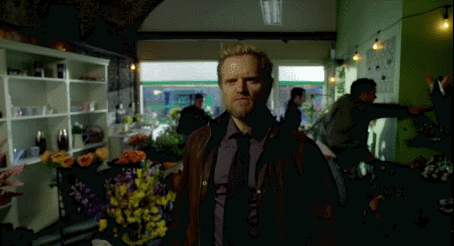
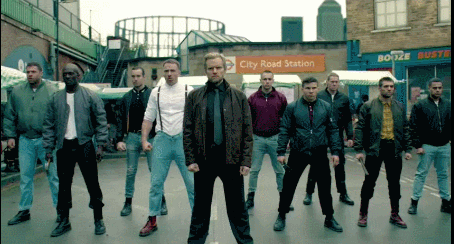
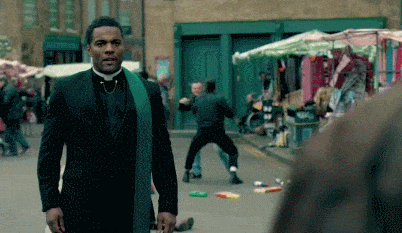
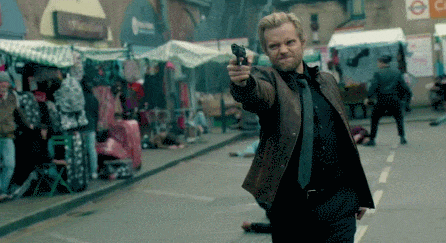
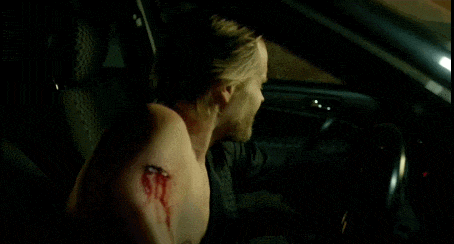
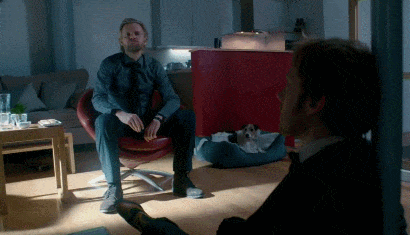
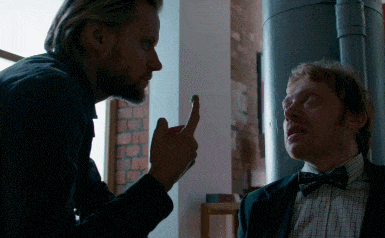
Snatch the Series: My Review
Note: this will contain spoilers, so read no further if you haven’t watched the series yet. It will also contain negative opinions on some issues, so if the show was everything you ever wished for... this isn’t for you and I don’t want to upset you. Just enjoy the GIFs (which betray my biases) and skip the rest.
I really, really wanted to like Snatch. Honest I did. I keenly anticipated it from the moment it was announced, despite my not being a huge fan of Guy Richie or the film version. The previews made the show look energetic and fun and most of the actors are consistently good, and playing types of characters they’re not necessarily known for, which I always appreciate. Also, fans of the other actors, Luke Pasqualino and Rupert Grint in particular, were very kind and helpful in providing news, BTS video and rare photos as the series filmed, and were-- mostly-- good about not posting spoilers without a warning.
So it saddens me to report I found the show more annoying than involving. A large part of that is due to the slipshod writing, underwritten characterization and reliance on jarring edits and often “WTF?!” character motivations and action that made it difficult for me to care about the protagonists (or even perceive them as protagonists, really... let’s say The Young Pretty People The Writers Clearly Wanted Us To Like.)
Mostly I’m upset Marc Warren’s considerable talents were wasted on such a grand scale. So much could have been made of Bob Fink in the hands of a more creative writing staff... every week on Fargo and Better Call Saul, to name just two current examples, corrupt cops and wannabe gangsters (who are often the same characters) have rich, unpredictable storylines which give talented actors a broad canvas on which to showcase their talents and play off one another. But the Fink charter is merely insulted by everyone in his orbit from the beginning (which, frankly, just made me sympathize with him), marginalized in most of the plot and never given enough to do.
I suspect Ed Westwick fans are also somewhat frustrated that Westwick, who was front and center in most of the promotion, was too easily dispensed with in episode four, and that most of his colorful momements were actually given away the commercials.
I'm still baffled by Marc’s treatment in that promotion. His name was literally never mentioned once by other actors or by the show’s Twitter, Facebook and Instagram feeds, though he’s the closest thing to a main antagonist the show has. (Photos of his character appeared, but Marc was never named.) Did Marc want to avoid being part of the publicity? Was it some sort of misguided decision by the marketing staff because Marc is relatively unknown here, or even because a handful of people keep whining about how much they disliked his character on The Good Wife? I just don’t get it. I’d like some answers about this.
But the promotional absurdities wouldn’t matter if Marc had been given a decent role to play, and he was shorted in that department too... Fink could have been a great villain or a great tragic character, but, despite some great acting moments from Marc, he wasn’t allowed to be either. The character is bullied, deceived and marginalized by both his gangster friends and corrupt police associates, yet the writing kept implying he deserved this without ever providing proof.
Then there was the Vic Hill character, who the writers clearly intended to be charming, but I saw only a thuggish man-child who continuously jeopardizes his family and bullies his perceived underlings. I hated him from the beginning and he only got worse. Dougray Scott’s hammily overdone performance didn’t help matters. I was on Bob’s side pretty much from the start... if only the writers had a clue about nuance and a willingness to challenge their audience or divide it, but... no. There was no character depth to speak of anywhere.
As for the young leads... the old kiddie ganster musical Bugsy Malone kept popping into my head. i couldn’t take them seriously as adults despite the fact these actors are in their late 20s-early 30s and more than capable of playing bona fide adults if they’d been given a decent script. Instead they were given hoary paint-by-numbers plot cliches cribbed from every gangster movie since the 1920s, padded out by clumsily-executed heist sequences and flashbacks that played like music videos.
In some ways it seemed like the series had two or three episodes worth of material, and the rest was filler, leading to a number of pointless tangents and inexplicable actions. The backstory about the gold was goofy at best, and nice coincidence about it resurfacing exactly when and where Albert, Charlie et al were planning to hijack Sonny’s cash (in an identical truck, no less). The show is full of such cartoonish improbabilities, though none delivered with the verve of an actual cartoon.
There are repetitive flashback’s of Vic’s original heist (yeah, let’s show Bob getting heaped with more abuse... ), loony side-stories filling in for character development (ie Billy’s whole backstory... what a wasted opportunity that was. Though Lucien Laviscount did a great job with the few subtle dialogue moments he got between having to beat people up and listen to crazy yarns about his parents), repetitive scenes of Charlie getting impaired in various ways, an out-of-nowhere love triangle that seems to be there just to divide the main group, female characters who have too little to do in general except be feisty and supportive (or, in the case of Dwyer, feisty and cuntish)... I get the sense the scripts were all written in the weekend before filming began, and that no one really scrutinized them closely.
Yes, I’m a Marc Warren fan and am biased. And I knew going in that he was probably playing an antagonist and that he’d get iced in the final episode... I’m used to all of that. Pretty much every actor I’ve ever admired from Lon Chaney Sr onward got typecast as villains or outsiders and got killed onscreen more times than Steve Buscemi does throughout the Coen Brothers’ oeuvre. I don’t have a problem with that. Conventional heroes and the squarejaws who play them bore me. I love complicated characters and character actors who seek out such roles.
But I don't appreciate youth-obsessed deck-stacking, treating bullies as heroes, and writing which both wants our protagonists to be “bad-ass” or at least risk-taking, yet continuously lets them off the hook, either through miraculous escapes or through having the older characters or one-note side characters take bullets for them or do the dirty work. Full disclosure: I haven’t bothered with the last two episodes because I was so disgusted with what went down in episode 8. I’m pretty sure the Young Pretty People prevailed and that Albert redeemed the sins of his father and finally said something nice to Charlie according to schedule. I can’t say I really care.
As in The Musketeers, Marc played a bullied, mistreated character who I couldn’t help but care about, both because Marc is such an exquisite actor even in marginal roles, and because I tend to side with complicated or oppressed characters, not with self-described “heroes”. In both shows, despite being the nominal villain, his character was shunted to the sidelines for too much of the duration, then suddenly given a lot of screentime just before being ganged up on and killed off. So yeah, the worst kind of deja vu... in The Musketeers at least Rochefort had some fun or powerful moments, and I understood that the show’s episodic structure hindered a more nuanced character through-line.
But Snatch has no such excuses. Also: couldn’t Bob and Charlie have had a sustained sequence or conversation without annoying cutaways to more trivial matters, like Vic torturing Charlie’s butler (which was played for laughs! God how I hated Vic...)? And why did Bob keep leaving the apartment? Apart from more plot-padding I mean? Why didn’t Bob shoot Vic when he had the chance? Because he really should have. Why was the whole tiresome side trip to America necessary, given how easily Billy got the diamonds back? Much of the plot strains on like that, making no sense.
The Snatch showrunners keep comparing their efforts to Fargo, Noah Hawley’s brilliant offshoot of the Coens’ film (of all their films, really)... they need to stop doing this. It does them no favors and it makes me pine for Marc to get cast on Hawley’s show (or anything by Vince Gilligan) instead. Yes, I’ve said this before and I’ll say it again, because the writers on those shows know something about ambiguity, character development, unpredictable plotting, creative musical cues, and, most essentially, how to hire great character actors and write roles worthy of them, then give them room to breathe onscreen. Hawley or Gilligan would’ve known what to do with Bob Fink. They could’ve done for Marc what they’ve done for Giancarlo Esposito, Bryan Cranston, Jonathan Banks, Bokeem Woodbine, Alison Tolman... even established stars like Ewen McGregor and Billy Bob Thornton have shown new capabilities on Fargo. I would donate my left kidney to see Marc on one of those shows, whereas if the Snatch crew had created Breaking Bad... I'm sure Walter White would’ve been killed off in season one while the balance of the show went on to document the hijinks of Badger and Skinny Pete.
I know I’ve gone on long enough, but I'm still bitter. ;) Marc Warren has really scaled back his acting commitments in recent years. I have no idea why, whether his priorities now lie elsewhere (and it’s none of my business to guess where), or whether he’s just not getting the calibre of role he’d like... if Snatch and Audible “Audio dramas” are the best he’s being offered, it must be very frustrating, but I don't want to judge his choices when I have no idea why they were made. Marc rarely gives interviews these days. He has said in the past that Mad Dogs arose from the poor quality of roles offered him at that time. If he and his actor friends wanted to crowdfund something along those lines I would do everything in my power to promote that or help. If Marc simply wants to focus his attentions elsewhere and not act so often, that’s perfectly within his rights as well. Of course he owes me nothing. I hope that when he appears at Birmingham’s Collectormania fancon to do signings next month (June 3) he’ll give us a hint of some kind. (Don’t worry, Marc, I won’t be there... I only do the fangirl thing from a distance.)
Anyhow... with Marc doing so few projects lately, it’s incredibly frustrating to wait months for something like Snatch, that so consistently fails to deliver. Marc does the best he can and has some great moments in spite of the limits he’s working under. As I’ve said, there was the potential for a great, messy, complicated character there. He deserved so much better.
#marc warren#snatch the series#bob fink#review#fargo#better call saul#bad show writing#fangirl problems
12 notes
·
View notes
Text
A clarification, not a review, of “Astroball”
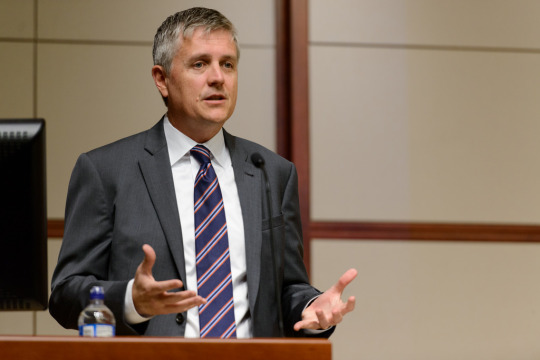
Some – not all, but some – of “Astroball” by Ben Reiter came about because of the author’s half-joking prediction in 2014 that the then-worst team in baseball if not one of the worst teams in baseball history, the Houston Astros, would ride their rocket scientists, mathematicians, corporate veterans and Ivy League college graduates who permeate their front office to baseball dominance and a World Series win in 2017.
The story would be interesting but not so easily salable had that freak guess not happened to come true.
But it did.
To his credit, Reiter acknowledges the lightning bolt nature of that prediction/guess/divine intervention– whatever you want to call it – coming to fruition. However, the remainder of the book serves as a love letter to the architect of the Astros’ rise, general manager Jeff Luhnow, to the degree that even his wrongs turned out to be not so wrong; even his mistakes contained a method behind the perceived madness; and any glaring gaffe stemming from arrogance, ignorance or coldblooded inhumanity could be mitigated and explained away.
As the Astros and Reiter bask in the afterglow of the achievement of their ultimate vision, it’s ironic that the relentless criticisms of the organization that had receded into the background rose again with the near simultaneous release of the book and, within 20 days, the club’s acquisition of closer Roberto Osuna who was only available from the Toronto Blue Jays because he was under suspension by Major League Baseball for an alleged domestic violence incident for which he was arrested with the case still pending in Toronto.
In one shot, the Astros regained their reputation for putting performance above people; for indicating that profit takes precedence over right and wrong.
In the immediate aftermath of the trade for Osuna, the handwringing on Twitter and outright criticism by columnists and radio hosts made it seem as if the Astros had never exhibited this type of borderline sociopathic tendencies in the past when it is precisely how they behaved to get so far, so fast. The World Series title and the narrative of how it was achieved gave them an “it worked” safety net.
Suddenly, the intriguing stories of Carlos Correa, Justin Verlander, Carlos Beltran and Sig Mejdal – for the most part, positive portrayals of generally likable people – were jolted back to the ambiguity of some of the Astros' clever, manipulative and underhanded tactics used to achieve their ends.
What cannot be denied and was shown again with the Osuna trade is the Astros did and do treat human beings as cattle whose survival is based on nothing more than their current usefulness; that any pretense of acceptable and unacceptable behavior hinges on cost and usefulness. The book’s attempt to humanize Luhnow and his staff in contrast with the manner they run the team was immediately sabotaged by acquiring Osuna.
The big questions about “Astroball” should not center around what’s in the book, but what’s not in the book.
Those who are either not invested in the concept of the Astros’ new way of doing things being the wave of the future or did not walk into the movie when it was half over and remember exactly what happened during the reconstruction will wonder about the following:
How is the name Andrew Friedman mentioned once for his role as president of baseball operations for the Los Angeles Dodgers and not as Astros owner Jim Crane’s first choice to be the Astros GM – with Luhnow the second choice?
How is it possible that the name Jon Singleton, who received $10 million for nothing, is nowhere in the text?
Why were the circumstances under which manager Bo Porter was fired completely ignored and treated as part of a planned process?
Why was the rushed trade for Carlos Gomez a shrugged off mistake with one sentence dedicated to it?
One man’s reasonable explanation is another’s farcical alibi. Depending on one’s perspective and agenda, both can appear true.
The drafting of Brady Aiken and subsequent attempt to lowball him following an agreed-upon contract was adapted to show how brilliantly conniving Luhnow was for offering the precise bonus amount to benefit the club in the subsequent draft should Aiken reject the offer as they knew he would – in fact, there’s an attempt to make Luhnow look benevolent for how Aiken was treated.
The release of J.D. Martinez is an admitted mistake…but then-manager Porter was blamed because he only gave Martinez 18 spring training at-bats the year Martinez arrived touting a new swing as if Porter was not being told what to do and had any choice in the matter as to who played.
“He (Porter) also couldn’t fail to provide someone like J.D. Martinez enough at-bats for the organization to make an informed decision about him.” (Astroball, page 143)
Are they seriously saying that Porter did not have it hammered into his head what the front office wanted and which players were to be given a closer look; that he was not an implementer of front office mandate with little-to-no actual say-so?
The above quote is one of many in the book that provide a between-the-lines elucidation of what the entire goal of the book is: to tie all the loose ends from that 2014 prediction to the prediction coming to pass, objective truth be damned.
Porter’s firing, rather than being due to the clear insubordination and an attempt to go over Luhnow’s head to Crane regarding how the team was being run, was mystically transformed into a preplanned decision.
Porter and numerous veteran players had an issue with former first overall draft pick Mark Appel being brought to Minute Maid Park for a bullpen session with pitching coach Brent Strom to see if they could fix what ailed him. (They couldn’t.) It was then that Porter and Luhnow were at an impasse and Luhnow was right to fire him. But part of the “process”? After Porter’s hiring when Luhnow made the preposterous statement that he might manage the team for two decades? How does that work? How is this explained away other than it being ignored?
It’s these and many other subtle and not-so subtle twisting of reality that call the entire book and its contents into question on a scale of ludicrousness and goal-setting to cast the Astros in the best possible light, all stemming from that silly prediction from 2014 when it was an act comparable to casually throwing a basketball over one’s shoulder with eyes closed and somehow hitting nothing but net.
One cannot discuss “Astroball” (the figurative New Testament for the reliance on statistics in baseball) without mentioning the Old Testament, “Moneyball”.
“Moneyball” gets a passing mention as the text that kicked open the door for baseball outsiders with ideas that were once considered radical and antagonistic to baseball’s ingrained conventional orthodoxy, but the two stories are intertwined like conjoined twins for whom separation would mean unavoidable death.
Reiter takes clear steps to avoid the same mistakes Michael Lewis made in “Moneyball”. Instead of it being an overt baseball civil war where the storyline was old vs. new and Billy Beane sought to eliminate the antiquated, Luhnow is portrayed as integrating the old guard and formulating strategies to quantify their assessments.
Whereas “Moneyball” took the MLB draft and turned Beane into a “card counter”, “Astroball” acknowledges nuance and luck in the draft.
While ““Moneyball”” treats the postseason as an uncontrollable crapshoot, “Astroball” implies the same thing without trying to eliminate any responsibility for continually losing as the Athletics have done repeatedly.
“Astroball” does its best to inclusive, albeit in a borderline condescending way, while “Moneyball” sought to toss anyone not on the train under it and then, for good measure, backed over them to make sure they were dead.
To that end, “Astroball” is somehow more disingenuous than “Moneyball”. “Moneyball” is how the old-schoolers are truly viewed in the new-age, sabermetric circles while their extinction is pursued opaquely in “Astroball”, making it easier for them to carry it out.
Those invested in the story being considered true will not give an honest review, nor will they ask the questions as to why certain facts were omitted even if they know the answers.
With that, the narrative of the Astros and their rise under Luhnow and Crane presented in “Astroball” is complete and a vast portion of readers and observers will believe every single word of it just as they did with “Moneyball”. They get their validation. And it’s irrelevant whether that validation was the entire point, as it clearly was.
Discarding facts from the past aside, the Osuna acquisition drops an inconvenient bomb right in the middle of their glorification. It’s that wart that shows who the Astros really are. If they just admitted it, they would deserve grudging respect. They claim to care about a player’s conduct and give hedging statements as to “zero tolerance” with that “zero” only existing when he’s an Astros employee. In short, they don’t care about Osuna’s alleged domestic assault just as they didn’t care about Aiken; they didn’t care about Porter; they didn’t care about Martinez; they didn’t care about any of the people who were callously discarded because they did not fit into the tightening circle of those who believe what they believe or will agree to subvert their own preferences as a matter of survival in a world they neither know nor understand.
For those who have a general idea of what is truly happening in baseball front offices and do not take these tall tales at face value, the book is entertaining enough in a televised biopic sort of way as long the creative nonfictional aspect is placed into its proper context. That context goes right back to the 2014 “prediction” that would have been largely ignored had it not happened to come true.
#HoustonAstros#Astroball#MLB#JeffLuhnow#JustinVerlander#CarlosBeltran#BenReiter#Moneyball#BillyBeane#CarlosCorrea#BoPorter#SigMejdal#MarkAppel#BradyAiken#CarlosGomez#JDMartinez#AntonioOsuna
0 notes
Text
Thin Ice
Latest Review: Doctor Who - Series 10, Episode 3: THIN ICE STARRING: Peter Capaldi, Pearl Mackie, Matt Lucas WITH: Nicholas Burns, Asiatu Koroma, Simon Ludders, Tomi May, Guillaume Rivaud, Ellie Shenker, Peter Singh, Badger Skelton, Austin Taylor, Kishaina Thiruselvan --- Written By: Sarah Dollard Directed By: Bill Anderson Produced By: Peter Bennett Executive Producers: Steven Moffatt, Brian Minchin First Shown on BBC 1 - 29th April 2017 NB - This review contains a plethora of spoilers (based on a Preview Edition of the Episode). The TARDIS has suddenly decided to take Bill and The Doctor off course. Both the precise location in England and the temporal zone are different to what was hoped for. Having been to the future of mankind, the ages-old academic and his youthful student find themselves instead in Regency London. It is a time of great development and industry, but also one where the slavery trade is in full swing. Many orphaned children struggle for survival on a daily basis. The Thames has been frozen over and this has led to a large-scale market being set up on the ice. However, warning signs have (barely visibly) been laid out, so as to remind people of the ice being less sturdy in certain regions. And this is with good reason. People have begun to disappear, and it would appear there is a connection to some un-natural green lights that can be seen through the frosty surface. Eventually the Doctor and Bill have to investigate in-depth, and some hard truths come to bear. For the first time, their relationship faces a test. But perhaps in facing a very human, very cold, monster in the form of Lord Sutcliffe, they can continue to function as a partnership of universe-weary wisdom, and fledgling careless brilliance. --- This story continues to see the 2017 sequence of Doctor Who in fine fettle, and assure viewers that soon-to-depart Peter Capaldi is now producing some of his best form (as opposed to phoning it in for a nice pay check and exposure via prime time scheduling). By now it is standard practice that the first two adventures proper for a companion of the Doctor, after the season opener, see a quick succession of the past and future. (The order tends to fluctuate, depending on the season in question). With these second and third episodes, at least there is a small change-up, utilising the secondary companion (as played by a confident Matt Lucas). The framing device of Nardole scolding the Doctor for going off world - which indeed is true for the events of Smile, if not technically this third adventure - is nicely done, and also includes a hint of what the Doctor and his part-robot-part-humanoid friend are guarding back in Bristol. Sarah Dollard came up with a wonderful debut story last series, and provided a most memorable official demise for Clara Oswald, with Face The Raven. This story is not quite up on the same level, and continuity-wise is not a game-changer. However, the many virtues of world building and characterisation are all present and correct, once again. Virtually all the on-screen players who end up as nutrition for the aquatic alien being are sketched out effectively - even if they have rather limited screen time to work with, due to the primary character development being devoted to our two regulars. This episode often makes no attempt to hide how it takes inspiration from previous stories in Doctor Who's lore. The Doctor advising Bill how to get to the wardrobe is a reminder of (the un-transmitted but frequently adapted) Shada. After the Doctor and Bill begin their explorations proper, the TARDIS pinpoints the size of the being under the ice, and also how much danger it poses, which is a faint echo of the ending moment of 1963's very first Who serial. More recent use of past convention is found in the use of the sonic screwdriver and psychic paper, with the former in particular driving the earlier parts of the story forward. Possibly even more so than prior episodes this year, the main heart of Thin Ice lies in the Doctor and Bill continuing to establish a working partnership together. Whilst the Twelfth Doctor noticeably ‘softened’ over the course of Series Nine, he still retained some darker edges, and these are particularly conspicuous at times. The cold manner in which he retrieves his sonic screwdriver from both the doomed Spider, and later one of Sutcliffe's thugs, leaves Bill repulsed and shocked. Noticeably she feels horror, irrespective of the actual personal qualities of the person who could not be saved from their fate. The Doctor also deciding to be far more mysterious (certainly when compared to his Ninth and Tenth incarnations) over how he has had to make difficult choices when saving people, and also when to kill, is a very nicely-played scene by Capaldi and Mackie. True, it could easily appear in any given episode at any opportune time, and is not necessarily dependent on the story surrounding it. But it still is fine work from the writing/production team, and of course the main praise should be reserved for our two lead actors. And in general, the Doctor is showing hints of his rather less personable qualities, which most of us have come to associate with his maiden season in 2014, rather than the somewhat breezier persona that crossed the airwaves on a weekly basis two autumns back. He is blunt to Peter Singh's 'Pie-Man' on their very first meaning, going so far as to undermine the legitimacy of the man's livelihood, back in a time of Earth history where ethics and truth did not have the same priority they do today. And whilst it is meant to be humorous for the audience (in a very knowing Roald Dahl fashion), his description of the lost children as being on the "menu", is indicative of his grim acceptance that the alien being simply is higher on the food chain than humans, regardless of whether it should belong in the Thames river in the first place. But there are plenty of lighter/warmer sides to our title hero too, with the mention of a magic wand being a reminder that whilst Doctor Who is officially a sci-fi show, in many respects it takes sustenance from traditional fairy tales and legends. The very first actor to play the role on TV, William Hartnell, once described the main character as a combination of a Wizard and Father Christmas, and his point still stands many years down the line. Also, the quiet little scene as the Doctor tells a 'bedtime' story to some of the orphans is beautifully played and directed. Suddenly the moral dilemmas are secondary, and all that matters is a wise man with grey curls, presenting a narrative with conviction and gusto. Come the end, as the remaining survivors find themselves fortunate to have a wonderful new property in which to live, there is a knowing look from the Doctor and Bill acknowledging that the deeds must be in the name of a male heir. Yet if the time-travelling genius could bend the law and change history to allow the charming Kitty to have the privilege of being the next in line, then he would. It is a moment that has huge impact on anyone with a semblance of heart and soul in them. Bill continues to put hardly a foot wrong, whether in terms of connecting with the audience or being acted authentically by the (comparatively inexperienced) Pearl Mackie. Along with other examples given here, there is a lovely moment where the Doctor's favourite student is overcome with wonder that she can walk on the Thames. Whilst the famous river is a great visual motif, it is also not associated with being crossed without the help of a vessel, and is heavily polluted. Later, when it is made clear what the villain's key motivation is in terms of the energy source he is obtaining, a very funny (if naughty) joke is made as Bill reacts point-blank. The full phrase would not pass the censors for a show like Doctor Who, even if movies shown even earlier on other TV channels get a free pass, but by being so coy in doing a quick edit, the effect is markedly pronounced. (And furthermore, another continuity echo is made, in terms of Rose teasing Cassandra, back in Series Two's opening story). The ending of the story is probably the most fully satisfying for the show in some time, with perhaps the last such occurrence being the conclusions of Heaven Sent and Hell Bent. Whilst perhaps simplistic, it is elegant and uses the decision to give just enough explanation via rapid editing, and travelling forward to the present day, with an archive newspaper article being knowingly referred by the Doctor. He often realises that sometimes an abridged account of the whole truth is for the best. That the ostensible monster of the story is not judged guilty of any wrongdoing, and is merely manipulated by Lord Sutcliffe, is welcome too. And show runner Moffat clearly has decided to steer away now from the overused 'everyone lives' trope. The good, the ambiguous, and the dastardly all firmly remain dead and buried. Thus, the Doctor's quiet admittance to Bill of the limits of his power to save people is not compromised in the final stanza. The episode also looks very impressive. The scenes underwater are built up to in a suitably suspenseful manner, before the efficient SFX work comes into play, accompanied by some of Murray Gold's best use of more subtle musical dressing. This ensures the core of the story is strong. Sometimes going into the murky depths of the aquatic can be a pace killer, but not here thanks to the decision by Bill Anderson to emphasise mood and uncertainty in the earlier sections of the story. Elsewhere on ground level many extras are used, along with ‘convincing’ animals in the background, and props galore. There is a sword swallower, some play fighters, and countless other novelties. Never for a moment does it not feel like the capital city of England developing at a fast knot, back in the time of the Regency era. So far, the show has done fine work in establishing who Bill is, by giving her plenty of character and plot-relevant material, this latest instalment very effectively addresses her attitudes to sci-fi itself, and more significantly to her identity as a woman with a mixed ethnic background. The character material on Bill being something of a sci-fi fan herself is mostly played as light-hearted self awareness, which is so indicative of Steven Moffat’s general style – both in Doctor Who and in his many other TV (and film) projects over time. Asking the Doctor to clarify if they are on a parallel world, and just why he calls his sonic screwdriver that name are amusingly played out in dialogue. However, the more worthy focus on attitudes of mankind concerning 'race' is made into a significant part of the story. Having the Doctor and Bill trying to integrate as best they can feels more important than in other episodes where the setting is simply pure fantasy/ sci-fi in nature. For the young lady from the 21st century England, there already is likely one too many a memory of being treated as inferior for the way she looks. To suddenly be back in her own country at a time when slavery was acceptable (be it of women, foreigners, those of 'other races', or even children) is a major jolt, and she immediately makes an effort to dress up so as to fit in, but clearly wishes this was not a requirement. And of course, eventually even that change of attire is not enough to stop a bigot from verbally abusing her. The man in question is Lord Sutcliffe, and this main villain for the episode is not a pleasant person in many respects. He seems utterly without empathy, and has a detachment about his overall operation, even if the end result would see him become richer (and thus more powerful) still. However the denigration of his ‘inferiors’ who do not share ('enough of') the same bloodline as him remains the most deplorable aspect. Whilst the Doctor and Bill manage to set time 'right', the story very quietly yet noticeably makes a point that the evil of slavery is something mankind must realise over time is wholly wrong. I have few real complaints with the basic narrative. It does in principle echo many episodes of yesteryear – something probably inevitable given how far the series has been in existence – but is never executed in anything less than an enthusiastic manner. Nonetheless, a general issue I have had with Series Ten again crops up here. We have at least one moment for the audience being ‘spoon-fed’, when the distinctive hat of Spider (the thieving little boy who could not be saved) is seen as rejected by the monster in the depths of the Thames, along with quick flashback of his thieving of the sonic device the Doctor so prizes. This reminded me of the repetition used concerning Heather meeting Bill on a night out, when the original image was already striking enough in how it was shot to resonate with the viewer. Perhaps though, exposition and clarification of the mystery does not quite verge on being so heavy-handed, as during the scenes in Smile where the TARDIS duo found out the whole truth behind the dilemma they were presented with. I mentioned Sutcliffe as serving the themes of the story well, but as an actual genre villain, he is rather middling overall. Whilst certainly played competently by Nicolas Burns, in that the audience is made to firmly dislike him, he also is very much out of his depth. The screen time afforded him is neither used efficiently enough to give us truly involving motivation and back story, nor abundant enough for him to be memorable in the viewers' minds after the episode has concluded. Sutcliffe's henchmen are never made into anything too chilling or threatening, but still have enough dialogue and commitment in the performances to convince viewers that they could have come from the criminal underworld, and are making the most of an employer with more money than most others. Dollard still does fine work with the villains, in terms of presenting the more corrupt and deplorable aspects of British society at the time, where gaps between the so-called upper and lower classes were wider than any cracks in the river's ice. However, the performances of the children are uniformly terrific, which is pleasing to see after Smile had a winning turn from Kaizer Akhtar. When the Doctor needs some exposition from the locals, it is the orphans who whole-heartedly give him the information he requires, and the story smoothly advances as a result. Furthermore this authenticity of portraying urchins who barely are able to keep themselves fed really helps the end of the episode. As the alien creature emerges from its 'prison' and is displayed in full, top-quality CGI glory, there is a great moment as Bill admires how it looks and is able to forgive it for being a killer. But the best part of the satisfying resolution is seeing the Doctor restore the barely surviving orphans to a place of safety – one far grander than any could have dreamed of. The wink in the eyes of both the Doctor and Bill as they turn the class expectations topsy-turvy, really helps this become a ‘punch-the-air’ moment. And it would not have been nearly so effective, if the children had not been as fully breathed to life in the performances by these youngsters. As good as our leads are here, and I expect even better work in the ‘bigger’ episodes to come, the main praise should be reserved for the quintet of Badger Skelton, Asiatu Koroma, Austin Taylor, Kishaina Thiruselvan, and Ellie Shenker. --- OVERALL ASSESSMENT: Series Ten's third individual story stands up well, as a very enjoyable outing in the early 19th Century. It is thoroughly watchable, whether the viewing takes place on a Saturday evening (as per tradition), or via a streaming device that does not have to be fixed down in a given time and place (like the TARDIS herself). And the icing on the cake? A snappy preview that sees the definitive Poirot actor – David Suchet – making a guest appearance, to potentially lend the hyperactive Time Lord some pearls of wisdom. http://reviews.doctorwhonews.net/2017/04/thin_ice.html?utm_source=dlvr.it&utm_medium=tumblr
0 notes
Text
Research Report
Major Project Title
(Or working title - how and why did this title develop?)
I would like this project to be entitled ‘Nemophilia’. However, the problem is that this word doesn’t actually exist. I derived it from the mostly abandoned noun Nemophilist which is defined as: One who is fond of forests or forest scenery; a haunter of the woods.To avoid the insinuation that the projects concerns an individual, some sort of character, I looked unsuccessfully for a form describing the general definition of the word, this led me to coin: Nemophilia. This however, is open to change.
This title developed purely out of it’s personal relevance to oneself. I was also encouraged by the connotations of Romanticism I believe are inherent in the word, or this would be suitable for the rather gothic-romantic aesthetic of my images. Furthermore, the word implies a love for one’s natural environment, this was especially suitable, as I am working toward a theme concerning the suffering one experiences as a result of the necessary separateness of material reality; the inability to be at one with the essential ‘oneness’ of nature. It is difficult to verbally discuss these subtle feelings without sounding absurd.
Research Methods
(What methods have you used during this phase of the project and how have they helped you develop your ideas and inform your major project proposal?)
Most of my research has been of either a practical or a literary nature. That is, experimenting with a variety of subject matter, equipment, media and chemistry. I have done a lot of research into the practicalities of the methods I’ve experimented with, as I try my best to master whatever I am doing in order to maximise creative control.
It terms of inspirational research, this tends to occur by accident, when I am not consciously trying to research but instead watching a film, walking in a park, sitting with ones own thoughts and so on. I enjoy this method of developing my ideas, because it is so much more tied to real life, real experience, which will in turn have a beneficial effect on the major project. Not that going to a library and consciously seeking out inspiration doesn’t have it’s place.
Pilot Project
(What have you achieved through the development of your pilot project/s? What have you learned from the process? Identify the main concepts that might direct or drive your major project.)
I have learnt that, for my particular way of working, I have to accept failure instead of coming to a halt every time I am disappointed by an outcome - because in the end these failures come together to form something positive. Persistence in a specific direction is essential. In a way, through the pilot project experimentation, I have chiselled away the dross within the creative part of my mind, removing what is unnecessary or poor quality by means of producing work inspired by my ideas. Slowly, as I have done away with more and more I have, from these failures, sculpted together somewhat unconsciously, what I set out to achieve.
Furthermore, I have honestly never put this much thought and effort into producing photographs before, and this is where I have been going wrong. I have never pushed myself to create photographs rather than just take them. I feel that, with this work, I have actually created images rather than simply respond to the world around me. And as a result, I believe I have benefitted, for I am pleasantly surprised by the success of some of the photos - not to say that there is not a lot of work to do, but I didn’t expect to be in this position at this stage. Additionally, I didn’t expect the images to correspond so accurately to how I imagined them. So I have achieved the benefits of getting out what you put in.
From this point, a few concepts may direct my major project. I believe the concepts are strong enough in a few of the images to be carried through to my F.M.P however only after they have been carefully tended to, as I had limited time, aspects such as editing, printing etc. have had to be neglected. I would like to spend an extensive amount of time finalising their presentation, something in the past I am usually unable to do due to poor time management on my behalf. Also I want to introduce other plans I am yet to undertake, mostly regarding printing. I want to look extensively into paper types and also alternative methods of development specifically those derived from coffee (Caffenol) tea, wine, and related. This, I hope will create the ‘yellow’ I want on the base in order for to hand-tint. I think having a base yellow tone and then tinting on top works better than a tinting a plain B/w Print, for the idea of selective colouring has been overused and has become cliche, I hope to avoid this. So, I shall look and practice extensively hand tinting, for it needs mastering to achieve the effect I’m aiming for.
Finally, I have learnt to become directly inspired by my own perception of reality, rather than in previous years where I felt my work was in a sense ‘forced’. I find it difficult to draw the line between reality and imagination in these images, for so many elements hold personal relevance to my reality. This will continue to drive my major project, for I feel inspired by the intimacy of the work to my life.
Audience and Context
(Has a consideration of Context and Audience made you think about your project in a particular way? Have you been aware of the histories, conventions and audience expectations of particular contexts? Have you considered different contexts and how have you responded to them?)
No, I have and always try to completely neglect it. In my view, there is little point trying to create something in consideration of the expectations and tastes of others. The best I can do, when attempting to create genuine art, is create a representation of my inner world, my inner perspective and hope that, as I experience it, there are other out there who do so too - and if they don’t, perhaps even better. I have always thought along these lines, however this was driven home when I showed some photographs of animals that died as a result of farming, the audience completely misunderstood my intention.
This images are for anyone who cares to look at them, for I feel the themes I have attempted to portray are, although perhaps remain dormant in many, are of universal application. They lies in all of us. An example would be when one reaches the top of a mountain, and the view is simply overwhelming, that one doesn’t know what to do with it, this common feeling is perhaps aroused by an inner desire to merge with the greater universe, a drive toward the unity of the all.
Production and Presentation
(Discuss the production methods you have been exploring through your pilot project. What effects do these different approaches visual strategies have on the work? What choices have you made in the refinement of your visual approach and why? Is the approach you have chosen effective in communicating your ideas to the identified audience?)
Techniques I have experimented so far include: Dry-Plate Photography, Hand-tinting and Emulsion Lifts. None of these proved successful in themselves, however it was through the failure of these various experiments that I have been pushed in other directions, reaching a point in which now, I can utilise any successful aspects of each experiment. For example, I shot a number of films in a old toy camera, made prints and attempted hand tinting in order to create a project with the theme of transience - this completely failed, however I have no scrapped the theme, and decided that the hand-tinting shall now be useful in my current situation.
I have finally been won over (reluctantly) by the simplicity and minimalism of using an iPhone and, admittedly it is excellent for developing your photography. Firstly, it has allowed me to photograph unexpectedly, that is, I have been creating images spontaneously, rather than the usual pre-planned, lugging around of heavy equipment ‘looking’ for images. With the iPhone, the images tend to find you. Also the disposability of these images, the fact one can shoot from any angle etc. imbues one with a freedom unavailable in film photography. I have created an Instagram specifically for this, in which I acted as unintentionally as possible - shooting what looks good, editing it to what looks good and then just posting it. I am indebted to this method this year.
Throughout my experimentation, I have refined the style of ambiguity within the images. For example, I began with Dry-Plates hoping this would create the level of dream-like ambiguous atmosphere present in Victorian Slides, however the effect was way to exaggerated and unpredictable. This search for a suitable ambiguous aesthetic has been refined through the various experiments, such as polaroid, and up to my latest refinement and perhaps most successful: to use the ends of 120 film, which are clear, but are covered in scratches, light leaks etc. Scan them, And then apply them on top of the crystal clear 120 images. As I wanted these images to be representations of my inner world, I was troubled by clarity and realism. I wanted elements that were recognisable as being physical and material, but imbued with a sense of dream etc. In other words, I wanted the images to remain realistic but to also seem as if they were not exactly ‘of-this-earth’ as we know it.
Visual References / Bibliography
(List the key visual and critical references you have explored during the research process. Discuss how useful these references were for the project and what you learned from them).
I tend to dislike looking for inspiration in other peoples photographs, as my images always end up appearing too similar. Therefore, for about a year now, I have used concepts, arguments and philosophies of various religious and spiritual authorities as a means of inspiration. This ensures a level of originality in the work as one is transforming abstract concepts to a material level.
Stalker - Film (Tarkovsky)
Nostalghia - Film (Tarkovsky)
Mirror - Film (Tarkovsky)
Sculpting in Time - Book (Tarkovsky)
Supreme Vice (Zelenkova)
Index of Time (Zelenkova)
777 & Other Cabalistic Writings - Book (Crowley)
Transcendental Magick - Book (Levi)
Tao De Ching - Book (Tzu)
Raja Yoga - Book (Vivekananda)
Zen Flesh, Zen Bones - Book (Reps)
Zen Art - Book (Holmes)
& more.
My main, and surprisingly least obvious inspiration was the work of Andrei Tarkovsky. I cannot explain, or overestimate what Tarkovsky’s films have done for me. They have transformed my perspective upon life, they have revealed the beautiful, the mystical and the poetic in the everyday. Tarkovsky has inspired me to create art compromising of my own archetypes, symbols and feelings. The work of Tereza Zelenkova has inspired me in that, I admire the unusual relationships of her images; that is, although the subject matter within a project is different from photo to photo, there is some sort of linking together, perhaps on a level above both the rational and the logical.
0 notes